#- but can only conceptualize her own identity in relation to his
Explore tagged Tumblr posts
Text
"From a physical standpoint, I'm not even close to eros."

I think about this moment from episode 3 a lot, as I think it was around my third or fourth rewatch of the show that I wondered about the explicit use of the word 'physical'.
Why would the creators of Yuri!!! on Ice have chosen to say "from a physical standpoint", instead of just "I'm not even close to eros", or something like "no matter how you look at it, I'm nowhere close to eros"?
In my opinion -- I feel the need to emphasize the use of the word 'opinion', because I want to be clear that this is my own headcanon, and in no way am I trying to assert fact about characterization -- I think the express use of the word might imply something about Yuuri's sexuality...specifically, that while he can't conceptualize of 'eros' as a physical thing (i.e. literally something he can channel with his body), that sexual attraction or understanding of sexual love is something that he has only ever been able to think about as an emotional idea.
Which lends itself to the possibility that Yuuri could be demisexual (gray-sexual).
I wanted to note right off of the bat that I'm certainly not the first person to entertain this idea. I really loved the write-up that @thegirlwhorideslikeasamurai created on Yuuri not getting eros and think it's one of the most thorough explanations for Yuuri's possible ace identity. (And @thegirlwhorideslikeasamurai, I hope it's ok that I'm linking your meta post!! Please let me know if not and I'd be happy to edit!). That post gives excellent explanations for why 1) Yuuri grinding on Viktor at the banquet, 2) the comment about being impregnated by Viktor's eros, and 3) his turning away from Viktor when he stretches in front of him at the onsen don't invalidate the possibility of Yuuri's ace identity.
If others know of good metas on the subject, please send them my way! I myself identify as demisexual, and it's always great to see this identity talked about in relation to my favorite media.
It's a concept that I'm excited to explore in my own writing.
Among my WIPs, I have been working on a multichapter Viktuuri developing relationship story -- it's an AU, one where Viktor and Makkachin begin swapping bodies during the period of time that Yuuri/Yurio are preparing for Onsen on Ice -- and in Chapter 3 (which I hope to upload in a few days), I'll delve into the possibility of demisexual Yuuri.
In particular, I'm excited to share my take on the 'Katsudon is my Eros!' dinner scene that the above screenshot borrows from.
I always thought it was notable that Makka was with Yuuri during his evening run where he wails in despair that Viktor/Yurio must find his ideas immature. Yuuri's willingness to have Makka with him in his distress signaled to me that he finds her presence comforting (I've always headcanoned Makka as female), which is notable, given that we know that at this point in canon, Yuuri still finds Viktor intimidating and has no idea how his idol perceives him.
#yuri!!! on ice#yuri on ice headcanons#yuri on ice#katsuki yuuri#yuuri katsuki#asexual katsuki yuuri#asexual yuuri katsuki#demisexual katsuki yuuri#demisexual yuuri katsuki
45 notes
·
View notes
Text
The Metahistory of David and Aurèle
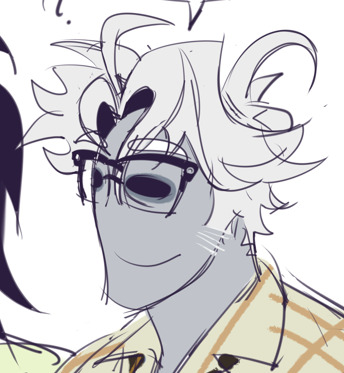
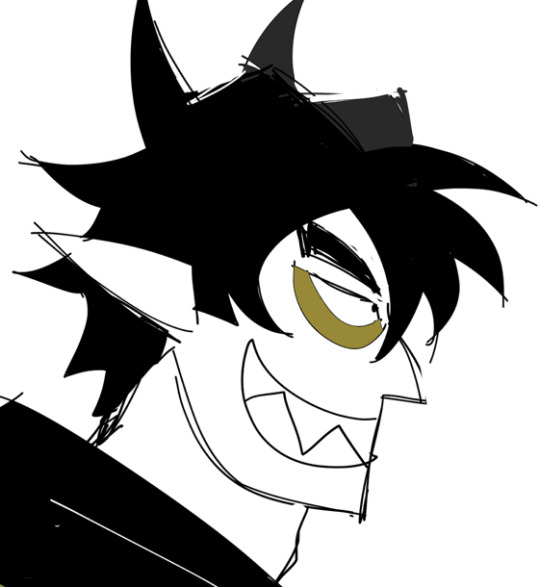
Requested by an instagram user.
They're only from 2022 but they have a funny contextual origin lol. once again I wont be including every single image of them cuz most of them are on derekdemetripoo.
Edit: I was going to title this a "Brief" metahistory but it's actually almost as long as Paz's so it's not so brief actually.
HONOURABLE MENTION 1 - LIFE: 5th August 2021

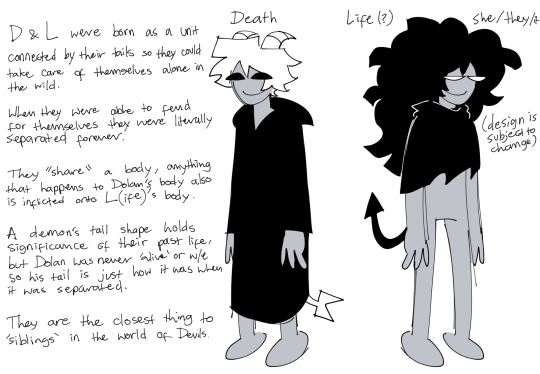
Figure 1. Death and Life | Figure 2. Death and Life bio, both 5/8/21
This has no relation to David or Aurele per se, but it should be mentioned the similar themes of opposites and yin and yang. Plus none of this is on derekdemetripoo so I might as well archive it. This was after Devil's Adequate era during early office era. Death had a sibling that was supposed to contrast with him. Hence, Life. I mostly wanted to do something with the reflected wound infliction trope. Later on she would become Devil.
HONOURABLE MENTION 2 - DEVIL: 4th September 2021
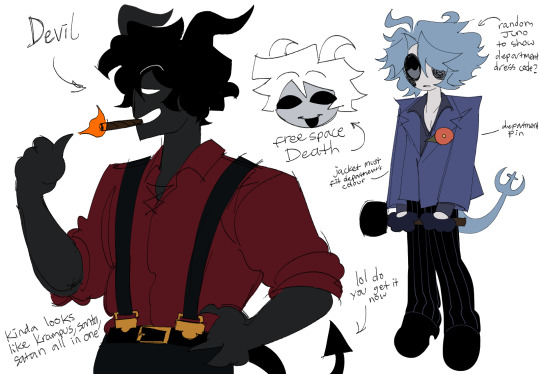
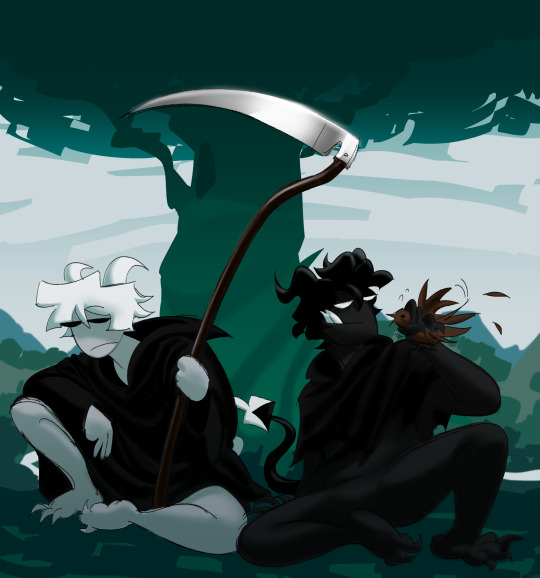
Figure 3. Devil first appearance (4/9/21) | Figure 4. Death and Devil (5th September 2021)
I reconceptualized Life to be a bigger contrast, hence the dark grey skin opposed to Death's light gray skin. Also: red vs blue. Still twins by now. More Devil art:
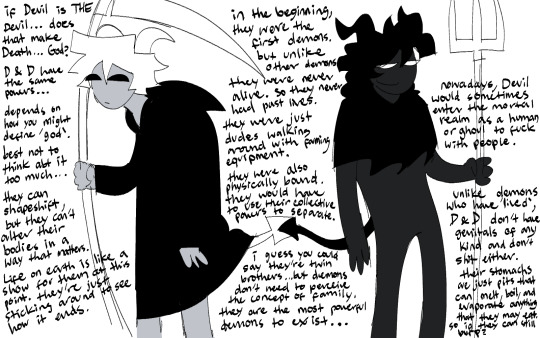
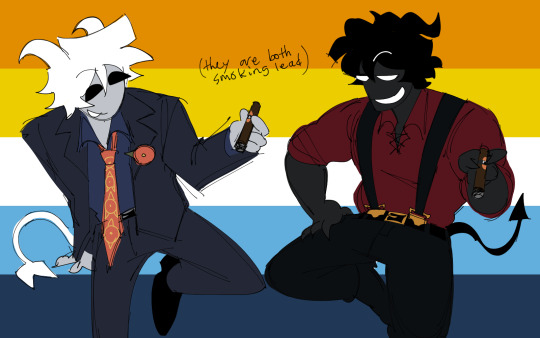
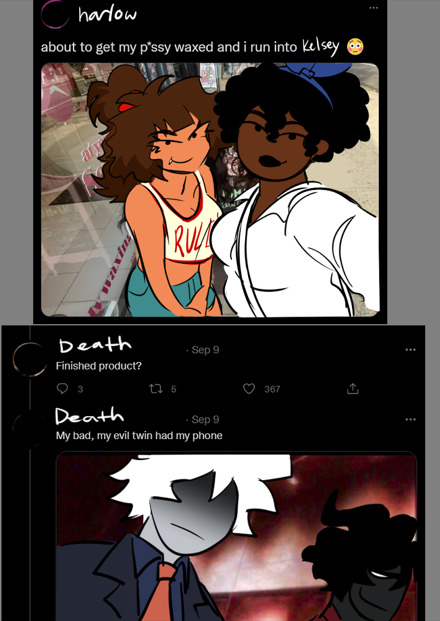
Figure 5. Death and Devil bio (8/9/21) | Figure 6. Death and Devil smoking lead (9/9/21) | Figure 7. Death and Devil commenting on Harlow's picture (13/9/21)
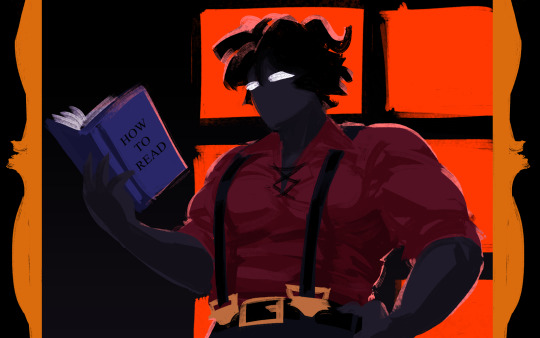
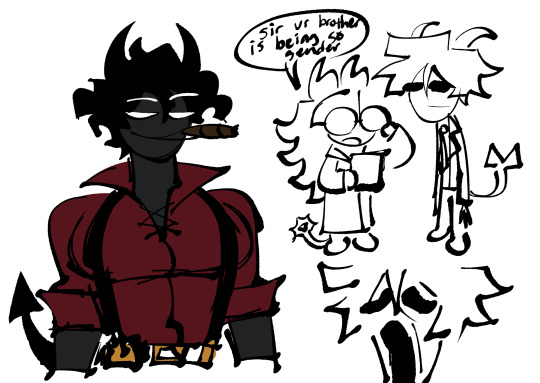
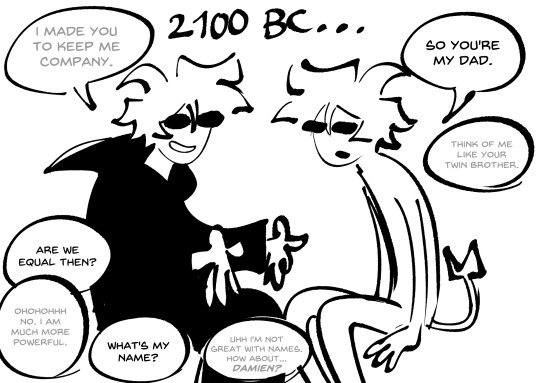
Figure 8. Devil reading (29/9/21) | Figure 9. Genderbend Devil (20/1/22) | Figure 10. Devil's origin (20/1/22)
In Figure 6, they're meant to be sitting on something, but nothing's there so it looks weird. Also they were aroace (see: the flag), but now I don't think much on Derek's (Death) sexuality. The girl with the crop-top in Figure 7 was originally an adopt named Kehlani, but I don't have much use for her anymore so I'm trying to resell her on toyhouse.
Figure 9, as bad as it looks, Death is supposed to be in shock. Even though Death has the ability to shapeshift, he probably didn't do it as much or to the same degree that Devil did. As implied by Figure 10 (a rewrite of Devil's origins), Devil has a bit of an identity problem because he wasn't born as his own person, but rather a clone of Death, so he probably shapeshifted pretty liberally to make up for his lack of individuality. Pretty interesting concept, too bad it's not canon anymore. By Figure 9, we had already made it into early TBOD development. This would be the end of Devil. The only relevance he bears now is his shared tail shape with Aurele.
AURELE'S CONCEPTION: 11th September 2022 (hashtag never forget)
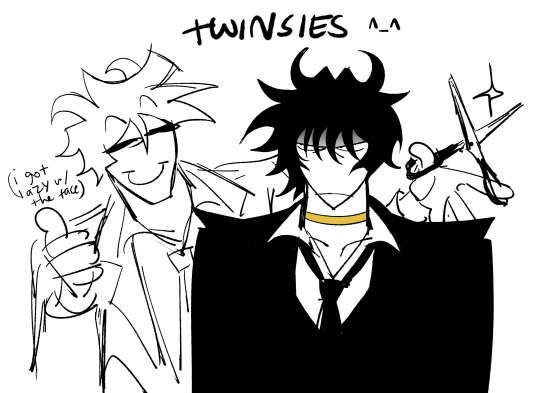
Figure 11. What would eventually become the basis of the au (11/9/22)
Almost exactly 2 years ago I drew this doodle of Aarum with short hair. The idea was to draw him and Derek with swapped hairstyles (Aarum short and Derek long) but I gave up on Derek because he looks ugly w long hair. This was also supposed to be a roleswap au, so that's why Aarum has a weird choker instead of his scar. In the end since I gave up on drawing swapped Derek it just looks like Aarum wearing a choker, which is ooc. lol
AURELE'S CREATION: 19th October 2022
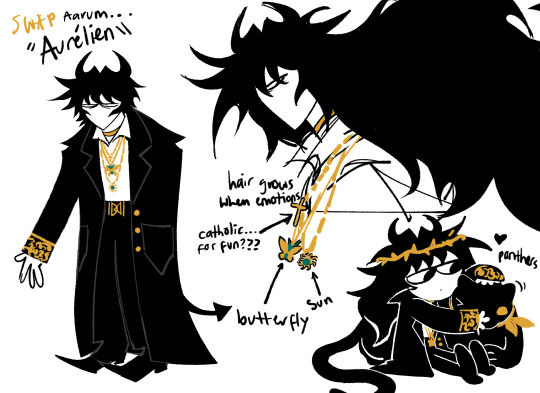
Figure 12. Aurele's first ref (19/10/22)
So this was when I decided to actually start cooking up the swap au. You can tell at this time Aurele was more like Aarum instead of a separate identity. The part about emotions doesn't really make sense because if he were what Derek is, he wouldn't have any to begin with, but maybe he chose to turn them on.
The pet panther thing does carry on to modern Aurele. Here is name is "Aurélien" and it was later that I gave him the nickname Aurele for short. Whether or not his name is still Aurélien I don't really care, I'm gonna keep calling him Aurele.
DAVID'S CREATION: 20th October 2022 (my birthday!!!!)
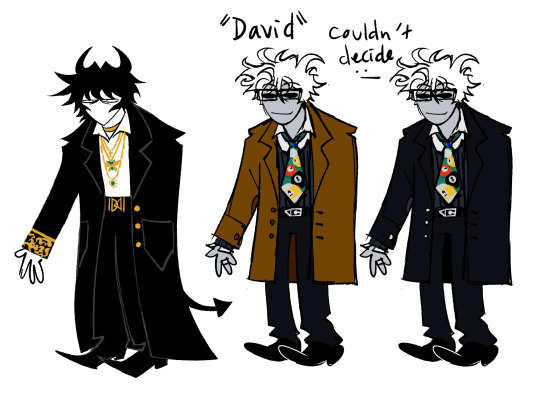
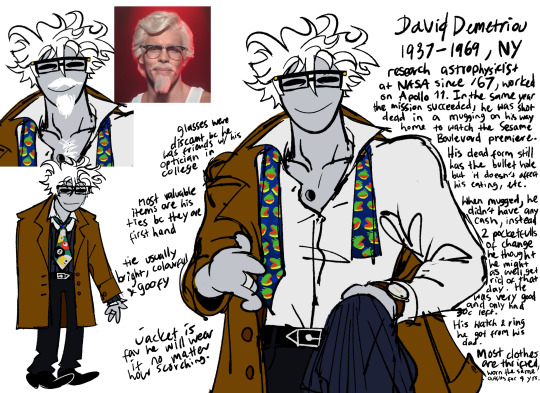
Figure 13. David's first concept | Figure 14. David's first bio, both 20/10/22
On my 17th birthday, I created David!!!! So he shares his conceptual birthday with me, but his canonical one with Derek. To this day I still love the David I drew with his bio, it's so insanely sexy even though it was the first time I'd properly drawn him. Very proud of that. He has never looked as good I'm afraid.
Now the swap au was complete. Back then I gave David the same surname was Derek because they're the same, duh. I later changed it to Demos to separate them as different characters. Since this was an au there was no kind of canon within it, whatever I happened to draw of it had little relevance or weight. Also, the infamous gay sex angst:
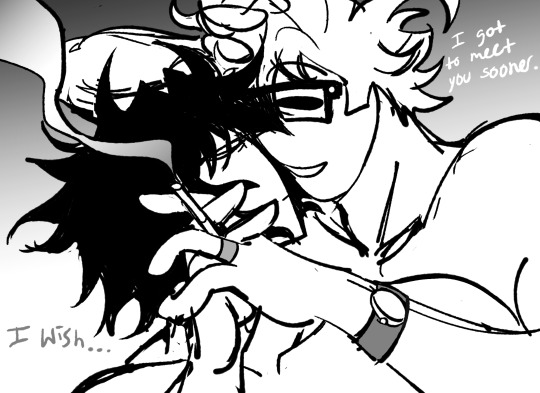
Figure 15. First sex on main (14th November 2022)
I still chuckle about how serious I was when I posted this. Needless to say it's not canon at all. It honestly reads better as David x Aarum than David and Aurele.
AURELE REBRAND: 10th December 2022
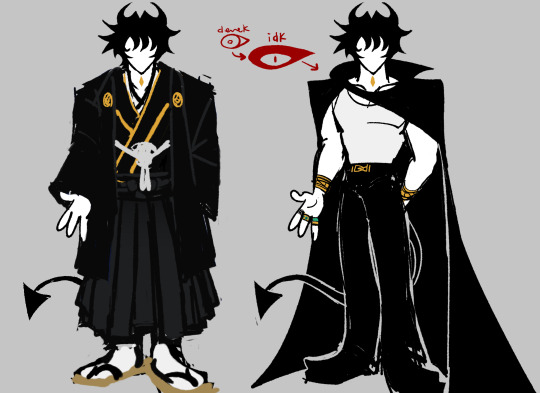
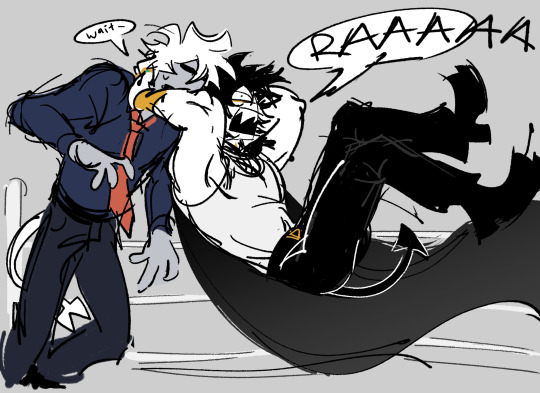
Figure 16. Aurele redesign (10/12/22) | Figure 17. Aurele and Derek (14/12/22)
Now came the era of true Aurele. He was no longer an Aarum copy but his own, chaotic person. Ultimately this is a way more interesting take on the swap au because if you had that much power you'd turn out different too. Also taking into account the sheer lack of social interaction that comes with it, making him more dense than Aarum is.
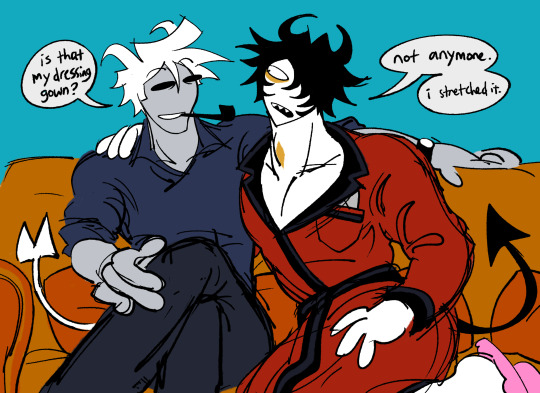
Figure 18. Derek and Aurele again (11th March 2023)
From time to time I would draw Derek and Aurele together as a funny hypothetical situation. It was never canon.
SIDEBAR: DAVID'S INTERESTS PT 1
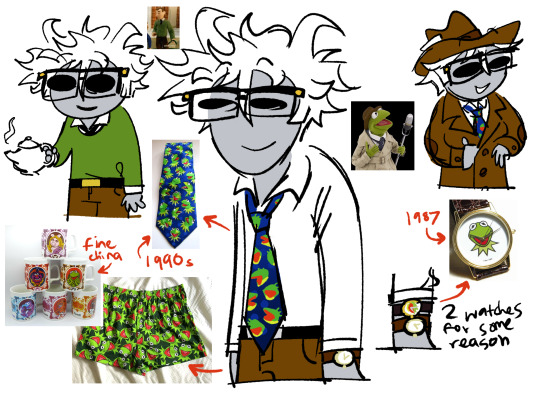
Figure 19. David and The Muppets (1/02/23)
It was around this time that I got hyperfixated on The Muppets so I made it one of David's interests. Weirdly enough, he had the kermit tie when I first drew him (before my Muppets fixation), so that interest was already there, but it was an arbitrary decision. I only amplified it after it became a hyperfixation. By the way, I have his tie irl. I don't have that exact watch, but a close one. I hid it somewhere in my room because the ticking was driving me insane, I think it's still somewhere there.
THE WHITE HOLE THEORY: 27th November 2023 onwards
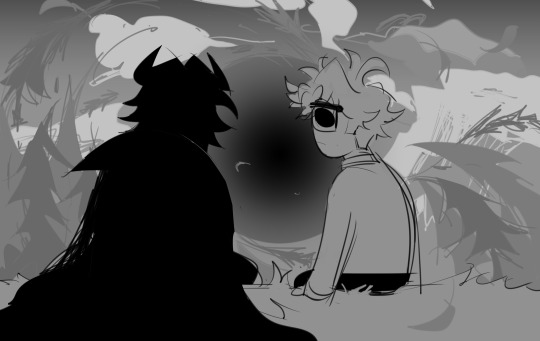
Figure 20. First concept of the White Hole theory (27/11/23)
The caption on the original instagram post:
"essentially this theory suggests dereks universe was actually created by aurele destroying his (inspired by an existing take on the big bang) bc he wanted to give david all his power to see what he could do w it. which was basically a reset but w david (now derek) in power and having forgotten everything. aurele was still sprinkled around in the new universe, thats what aarum is. he is as much aurele as derek is david. which is to say, sort of, in essence!. so yeas. i guess u could say. love endures 😊❤️! i also like this theory bc it implies derek isnt alone in that aurele was like him before the restart. but they cant ever meet in their true /essences/. only with one being sort of a reincarnation of themself this isnt to say both universes are exactly the same, bc theyre not. for one, derek's universe is actually a multiverse. bc derek created the multiverse (youll see why in the book), whereas aureles was just one this is not canon lol im just having fun, call it dubiously canon...."
That's about it. It basically still holds up to modern development. Now there was some weight to this au, in that it might not even be an au! it might be the u! but before the u even existed. Fun!
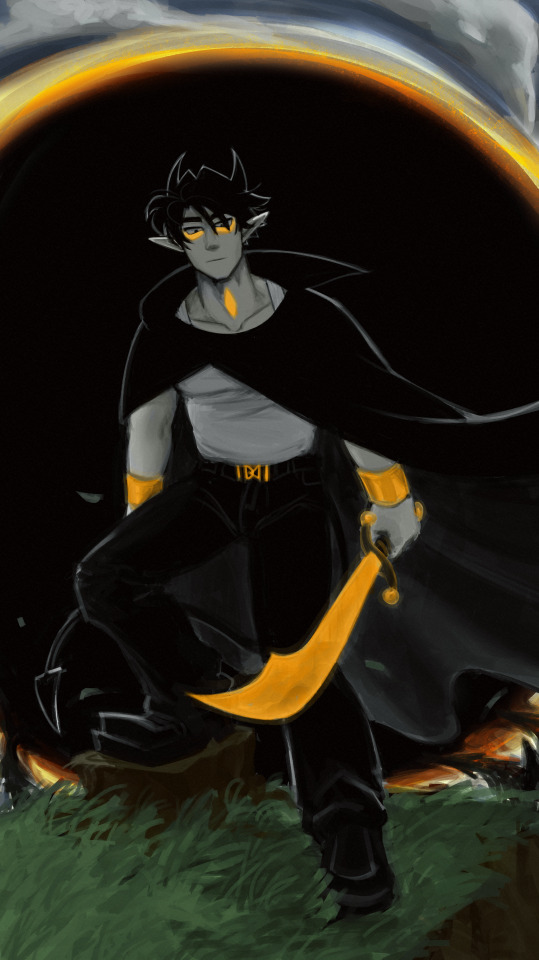
Figure 21. Aurele painting (26/8/24)
DAVID LORE UPDATE: 4th June 2024
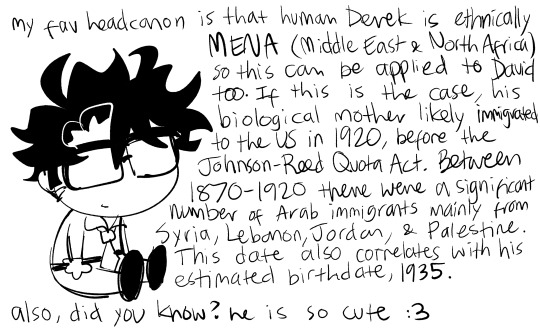
Figure 22. David facts (4/6/24)
Felt it was somewhat relevant to include this. A bit more about David's origins however his birth year here is 1935 instead of 1937, so he would've been 34 when he died. Maybe it was a mistake, or maybe it was a lore change. Not sure. I think I like 32 better.
SIDEBAR: DAVID'S INTERESTS PART 2
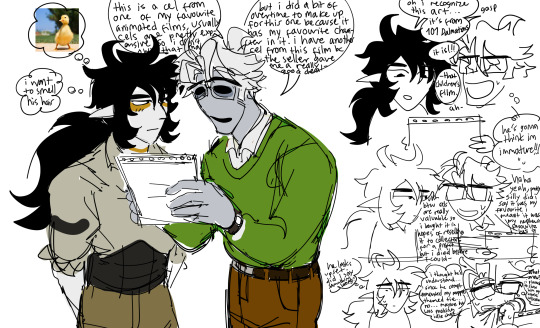
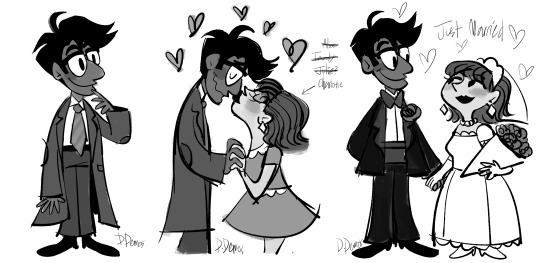
Figure 23. David and Aarum (15th May 2024) | Figure 24. First appearance of David's art (11th August 2024)
I had already been entertaining the idea of David being interested in animation (like me~~~~) and I eventually made it canon (Figure 23). From that interest, he'd also know how to draw and maybe even animate (Figure 24), his art style was inspired by Hanna-Barbera cartoons & The Beatles cartoon, both of which were around when he was alive.
From Figure 24, I began to think of another plot point in David's afterlife, from the patreon:
"if u didnt catch the august request dump, davids fake imaginary girlfriend is charlotte and i think after he died aurele would offer to make her real but it wouldnt work out bc of the ethical concerns."
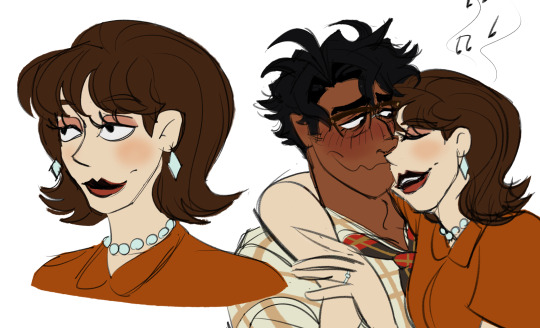
Figure 25. David and Charlotte (22/8/24)
Everything after December 2023 is pretty streamline, so there's no need to really talk about those individually. There is actually a bit of plot in David & Aurele's life, but I never wrote it or drew it or even talked about it. I just thunk it. I will probably get into that in the future. Now I'm really sleepy after writing all this.
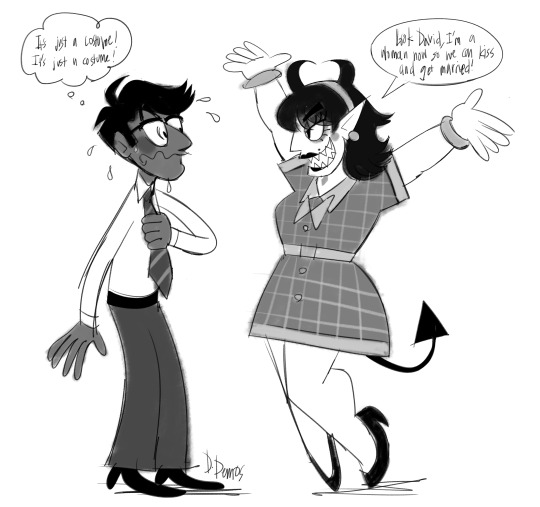
Figure 26. David and Aurele by David (21/8/24)
Hope you enjoyed, goodbye.
12 notes
·
View notes
Text
I want to talk a bit about Tears of the Kingdom.
It's hard for me to do that, because all my feelings about it are contradictory and tangled up. I think its storytelling is incoherent and is actively hindered by the game structure, but it also has unquestionably some of the best story beats in the series. I find the open-ended creativity encouraged by its mechanics wild and engaging, but in practice I tend to just fall back on a few simple solutions and get frustrated when they don't easily apply to the thing I'm trying to solve. Most of all, I think it (alongside BotW) represents a much-needed shakeup to a series that was getting entirely too stale, but it is those very games that stagnated the franchise that made me fall in love with it.
Expanding on the second point I just made; I think TotK might be the only game I've played (that isn't a fighting game, anyways) that makes me feel inadequate. I know enough about its mechanics to understand that, conceptually, there's an incredible amount of potential Nonsense you can do with Ultrahand, but I just don't know how I should tap into that potential. I think it's admirable that the game doesn't tutorialize everything and lets you discover functions on your own, but because of that I've missed critical information about mechanics and felt like a complete fool for having to look up the information online (case in point; I had to consult the internet to figure out that I had to hit devices to activate them). I often have this background feeling that I could be doing something more interesting and effective when I'm playing TotK.
But really, most of my issues with TotK come from the lore implications. Gonna put a break here because spoilers. It's kind of just a rant after this point.
I've always been sharply aware that the devs aren't really concerned with adhering to an extended continuity and would rather craft a self-contained experience, but I just can't get over how weird TotK's story and backstory are. I'm still not sure what to make of the revelation that APARRENTLY there was just a SECOND GANONDORF the whole time who nobody knew about, and I'm still not really sure if Calamity Ganon was the classic Ganondorf degraded to a primal form after millennia of reincarnation (as I believed before TotK dropped), or if it was related to this game's new ancient Ganondorf? It's a messy situation that's only a problem when you're thinking about BotW/TotK in the context of the rest of the franchise WHICH IS COMPLETELY REASONABLE
Also the memories are just so strange. They feel like a warped retelling of OoT's first act, especially since a main character shares his name with an OoT character, a name which is not one of the many continually-recycled named the series uses which makes it sound way more significant! Like when I was playing through, I had this weird creeping feeling that this game was trying to replace OoT with this new backstory? Like obviously, no, it isn't, but it hit so many of the same important beats! Ganondorf allies himself with the king of Hyrule (even mirroring a shot from OoT), Zelda realizes he's up to something and tries to stop him, only to fail spectacularly such that Ganondorf gets the exact empowered artifact he was gunning for the whole time. Even Zelda transforming into a dragon to repair the Master Sword and sacrificing her identity in the process reminded me of Link in OoT drawing the Master Sword and losing his childhood, LIKE THEY'RE TELLING THE SAME STORY, WHAT IS GOING ON
I don't have a conclusion, I don't have a thesis, I just have opinions and I needed to vent them
15 notes
·
View notes
Note
Ok along with the Eiffel regaining his memories with music, as like a “what happens in the future” thing the power of music relating to memory is also something that could work with the dear listeners.
Like music is not only something they haven’t conquered yet, but it is also potentially a new discovery for them about the connection music has to memory? Cause they obviously have a lot of knowledge about memory (lovelace’s memories, getting into Eiffel mind, etc.) but since they don’t understand music it’s a whole new facet to the memory thing!
Lol anyways I’m mostly rambling, but dear listeners and musical memory!
you know, that's got me thinking... the dear listeners can clearly reconstruct memory, they can access eiffel's memories, they can alter the mental infrastructure of other beings, lovelace's blood protects her and the others from pryce's mind control, etc. but how would they actually conceptualize memory? memory is in so many ways about how an individual person perceives the world around them - about bias, and change, and growth... self-perception, and the way we relate to others as singular beings trying to communicate our own experiences.
memory is clearly part of the "template" for the duplicates; they all show up like they were preserved exactly at the moment they were copied. the tiamat crew observed emerging differences between them, but i think that's mostly situational + perspective. at the moment they show up, they're the same, but everything that happens to them from that point on is going to be unique to them, and will shape them differently, even in little ways.
the dear listeners have a collective memory, awareness of concepts and knowledge like they implanted in eiffel's mind, but they don't have a concept of personal identity. would they even understand that connection between memory and music, or the significance of eiffel regaining his memory at all? is the understanding of memory as the part where "you" come in - the idea of a "you" in that sense at all - also a human concept within the context of the show?
i don't really have an answer to this, but i think i like what it suggests. if music is the hallmark of humanity, then that connection between music and some very human sense of self, things that have to be understood on a personal level... that the songs that resonate with eiffel can only resonate with him the way they do because he's eiffel. the soundtrack of his life isn't interchangeable with anyone else's.
#thank you!! i'm sorry this took me a few days to reply to!! i wanted to think about it. this feels very rambling#and i couldn't really think of a better way to communicate this idea so. i hope it makes enough sense.#it's always kind of hard to know how much to factor the dear listeners into stuff like this too because their presence is. by nature#on such a Big Picture timeline.#and the dear listeners... even the way they 'create' is so. stagnant. i'm not sure how to express it except...#there's a line from angel (paraphrased): 'after a while [a single note] is just noise. it's the change we're listening for -#the note after that and the one after that. that's what makes it music.'#asks
9 notes
·
View notes
Text
i keep thinking about what kim bi says about family in her interview
VC: After meeting her “mother,” Ran comes to realize the importance of “chosen family” and how strong her father has been. What does the word “family” mean to you? KB: Hmm . . . This is probably the most difficult question to answer. For me, family has not been a “shining” thing. Unfortunately, I think my family may have been a mixture of all possible despair, be it ruined people, hurt people, discarded people, or people sacrificed to the violence of the state. My father was injured during the Korean War and was in pain until the day he died. My mother, who bore the brunt of my father’s violence when he drank away his pain, left, leaving behind us three kids. And because of this trauma, my brother became an alcoholic too. My younger sister was probably the greatest casualty: she not only bore all of this despair but also, on top of that, had me, a “transgender” older brother. Of course, I don’t believe that my identity is in any way tied to the ruination of my family life. I believe that we are “born this way,” but it seems that the apriority of being transgender is still the subject of much debate, isn’t it? But is it really important if you are transgender from the moment of birth or not? Isn’t it enough to take responsibility for yourself and your own happiness by changing the way your life might be going for the better? Anyway, “family” always played the role of chaos and more chaos for me. That’s why I don’t know how to write a family that longs for and cares for one another. Since I’m writing works of fiction, I can, of course, write a loving family from my imagination, but if I do, I always feel empty. Since it is something that I was never able to have, I should be able to write what I want, but because my stories are always expressing deeper thoughts, I can’t just write something flippantly. I may already think that that kind of family is unnecessary, which may be why I tend to depict “chosen families” as something far warmer and more comforting. I am also of the belief that humanity needs to broaden its understanding of what family is. We’ve come to an age where we need love for humankind more than familial love, and following this path going forward, rather than limiting “family” to those of the same name or bloodline, I will continue to write stories that center people who are looking out for those closest to them, trying their best for them, and growing.
narratives that reconcile queerness with family resonate with me greatly just by virtue of, my experiences, but i find a lot of it is done as "person finds new people that isn't their blood family and those ties become stronger than the ones with their blood family, who suck ass", which is fine, but it doesn't strike the same chords for me i guess.
in "Tree of Kisses", Ran is an adopted child and her father is a trans woman who took her under their* wing. it reads as the story of living with a queer relative and the hardships tailored to that situation. but central to the story is the fact that Ran is also not someone that society would accept. her mother left the house, her father is trans, and then it turns out she's not related by blood to either of them anyway. at the most she's objectified and dehumanized as something to be pitied: theyre both corrupt existences in a sense. theyre both "queer" in the non-identity sense of the word
and Ran and her dad were also alienated from each other. from Ran's perspective is a certain horror of her expectations of a father figure being an illusion, the foundation of what she loved embodying queerness-- broadly she was afraid of the concept of queerness that she saw in her "dad', and then because her conceptual perception of her "father" is part of herself, the queerness that she recognizes in herself (her adoption, her isolation from her peers, her parents' divorced status, etc)
her arc is about accepting herself as much as it is about accepting her father. she accepts the horror, acknowledges it and chooses to love it. and it is through that choice that enables the gap between her and her father to grow into something that embodies connection. they cease to be a "dad" and start being her family. the person who chose her and who she chooses back.
**The text of the story refers to Ran's parent as her father and uses neutral masculine/neutral pronouns. I use neutral pronouns to respect the writer's intentions in conveying this nuance.
#exilley's diary#codeword: misc#it's just like ikuhara said.......even if it was a punishment i wanted to stay with shouma 💥
0 notes
Text

less than a shadow
#kingdom hearts#kh#kairi#naminé#this is for anon who requested kairi and naminé a little while ago#i couldnt quite fit this in the description concisely but#the idea that kairi compares herself to sora (and riku) and not just sees herself as lesser -#- but can only conceptualize her own identity in relation to his#like when sora released her heart from his maybe it didn't all come back in one piece. maybe it wasn't all neat and compartmentalized#and naminé being a symbol of that - she was made from kairi's heart but she's half sora#born of sora's body her existence intrinsically linked to his#and of course kairi wants to be like sora but god what is SHE?#what is she? what is she?#my art#kh art
986 notes
·
View notes
Text
Wonder Egg Priority Episode 4: Boys’ and Girls’ Suicides Do Mean Different Things (But Not in the Way the Mannequins Want You to Think!)

So, let’s talk about this for a second. After I got over my initial knee-jerk reaction, I realized I wasn’t sure how to make sense of exactly what the mannequins were arguing for here. So let me rephrase their statements to make the argumentative structure more explicit: Because men are goal-oriented and women are not, because women are emotion-oriented and men are not, and because women are impulsive and easily influenced by others’ voices and men are not, boys’ and girls’ suicides mean different things – girls are more easily “tempted” by death, and therefore, more likely to require saving when they inevitably regret their suicide. While Wonder Egg Priority, so far, seems to agree with the vague version of the mannequins’ conclusion, namely that boys’ and girl’s suicides mean different things, it refutes the gender-essentialist logic through which that conclusion was derived.
The mannequins choose a decidedly gender essentialist approach in explaining the difference between girls’ and boy’s suicides; they argue that the suicides are different because of some immutable characteristic of their mental hard wiring (in this case, impulsivity, emotionality, and influenceability). Obviously, this is a load of bull, and Wonder Egg Priority knows it. The mannequins are not exactly characters we’re supposed to trust, seeing that they’re running a business that is literally based on letting these kids put themselves in mortal danger. As faceless adult men, they parrot and possibly represent the systems that force these girls to continue to be subjected to physical and emotional trauma (it’s probably more complicated than this, but four episodes in, it’s hard to say more). So, we’re probably supposed to take what they say with great skepticism. Also, the director, Shin Wakabayashi, has recently said that in response to these lines, Neiru was originally going to object, “When it comes to their brains, boys and girls are also the same,” (which unfortunately is not exactly true and is somewhat of an oversimplification, but the sentiment is there). While that line ultimately did not make it in, Neiru does reply with a confused and somewhat indignant, “What?!”, a reaction that gets the message across. Neiru is not a fan of gender essentialism, and as a (more) sympathetic character, we’re supposed to agree with her.
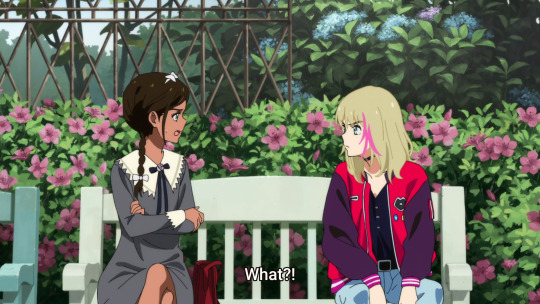
That is, the differences between boys and girls is not something inherent to their biology or character, but something constructed by culture and experience. This rejection of gender-essentialism is apparent in Wonder Egg Priority’s narrative, which takes a more sociocultural perspective on the difference between boys’ and girls’ suicides. It says, well of course boys’ and and girl’s suicides don’t mean the same thing, that’s the whole reason why we’re delving into the experiences specific to being a girl (cis or trans) or AFAB in this world – to show you how girls’ suicides are influenced by systems of oppression perpetuated by those in power (ie. the adult, in this specific anime).
And all the suicides we’ve seen up until now tie into that somehow. For instance, Koito is bullied by her female classmates who think that Sawaki is giving her special treatment. This is a narrative that comes up over and over again, in real life as well: that if a young girl is being given attention from an older man, then it’s her fault – that she must want it, or at least enjoy it somehow, and that it signifies a virtue (eg. maturity or beauty) on her part. And if Koito is actually being given such treatment by Sawaki, an adult man in a position of power over her, that is incredibly predatory.

And we all know that child sexual abuse is something that overwhelmingly affects girls, with one out of nine experiencing it before the age of 18, as opposed to one out of 53 boys (Finkelhor et al., 2014). Regardless of whether Sawaki was actually abusing Koito or if the students only thought that he was, Koito’s trauma is ultimately the result of this romanticized “love between a young girl and adult man, but not because the man is predatory, but because the girl has some enviable virtue that makes her desirable” narrative. Similarly, in episode 2, Minami’s suicide is driven by ideas related to discipline and body image in sports, which while not necessarily specific to female and AFAB athletes, is framed in an AFAB-specific way. For instance, take the pressure on Minami to “maintain her figure”. Certainly, male athletes also face a similar pressure, but we know that AFAB and (cis and trans) female bodies are subject to closer scrutiny and criticism. We know that young girls are more likely to suffer from eating disorders. And Wonder Egg Priority situates Minami’s experience as decidedly “about” AFAB experience when her coach accuses her change of figure due to her period as a character failing on her part.

Likewise, episode 3 delves into suicides related to “stan” culture, this fervent dedication to celebrities that is overwhelmingly associated to teenage girls. And Miwa’s story, in episode 4, explicitly shows how society responds to sexual assault. When Miwa does have the courage to speak up about her assault, she’s instantly reprimanded by basically everyone around her. Her father is fired because her abuser was an executive of his company. Her mother asks her why she couldn’t just bear with it, telling her that her abuser chose her because she was cute, as if that’s supposed to make her feel better about it. Wonder Egg Priority shows that this sort of abuse is a systemic problem, a set of rules and norms deeply engrained in a society and upheld by all adults, regardless of gender, social status, or closeness (to the victim). Wonder Egg Priority says that, yes, girls’ and boys’ suicides have different meanings, but it’s not due to some inherent difference between the two, but the hostile environment in which these girls grow up. Girls are not more easily “tempted” by death, they just have more societal bullshit to deal with.
But Wonder Egg Priority goes further than just showcasing how girls’ (and AFAB) experiences are shaped by sociocultural factors. The story also disproves the supposedly dichotomous characteristics that the mannequins use to differentiate girls and boys (i.e. influenceability/independence, impulsivity/deliberation, emotion-orientation/goal-orientation). If the mannequins are indeed correct, and that girls are just influenceable, impulsive, and emotional, you’d expect the girls in the story to be to be like such too. Except, they aren’t. Rather, they’re a mix of both/all characteristics. This show says that, certainly, girls can be suggestible, but they’re also capable of thinking for themselves. For instance, when Momoe asserts her own identity as a girl at the end of episode four, she rejects the words of those around her who insisted that she isn’t a girl. If she were as suggestible as the mannequins believe her to be, that would never have happened – she would have just continued believing that she wasn’t girl “enough”. But, she doesn’t because she is equally capable of making her own judgements. Likewise, Wonder Egg Priority shows that girls can be impulsive, but they can also be deliberate and pre-mediating. When Miwa tricks her Wonder Killer into groping her to create an opening for Momoe to defeat it, she’s not doing it out of impulse – it’s a pre-mediated and deliberate choice unto a goal. And Wonder Egg Priority continues, girls can be equally emotion oriented and goal oriented. Sure, the main girls are fighting because they have the goal of bringing their loved ones back to life, but those goals are motivated by a large range of emotions, from guilt to anger, grief, compassion, and love.
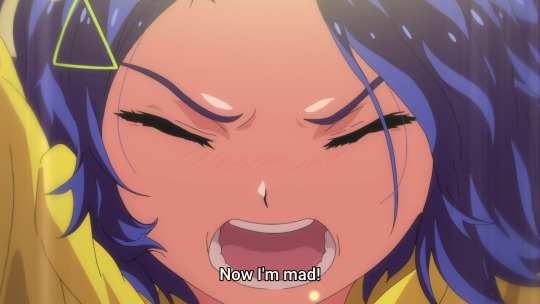
Being emotion-driven doesn’t mean you’re not goal-driven, and vice versa. In fact, in this case, being emotional drives these girls toward their goals. In other words, none of these traits that the mannequins listed are either “girl traits” or “boy traits”. Being one does not mean you can’t be the other, even if they seem dichotomous at first. Wonder Egg Priority’s diverse cast of multi-dimensional female characters allows it to undermine the mannequins’ conceptualization of gendered roles, refuting the idea that these (or any) character traits should be consider gendered at all.
As an underdeveloped side thought, I think Wonder Egg Priority’s blurring of gendered roles is also well-reflected in its style. There’s been a lot of talk about whether Wonder Egg Priority constitutes a magical girl series, and I think that’s an interesting question deserving of its own essay. Certainly, it does follow the basic formula of the magical girl story: a teenage heroine ensemble wielding magical weapons saves the day. But it also throws out a lot of the conventions you’d expect of a magical girl story – both aesthetically and narratively. Aesthetically, it’s probably missing the component that most would consider the thing that makes an anime a magical girl anime: the full body transformation sequence, complete with the sparkles and the costume and all that. Narratively, the girls are also not really magical girl protagonist material – they’ve got a fair share of flaws, have done some pretty awful things (looking at Kawai in particular; I still love you though), and aren’t exactly the endlessly self-sacrificing heroines you’d expect from a typical magical girl story. On the other hand, the anime also borrows a lot from shonen battle anime. We get these dynamic, well choreographed action sequences full of horror and gore, the focus on the importance of camaraderie between allies (or “nakama”, as shonen anime would call it) exemplified through all the bonding between the main girls during their downtime, and in the necessary co-operation to bring down the Wonder Killers. That said, this anime is not a shonen; the characters, types of conflicts, and themes are quite different from those that you’d find in a typical shonen. The bleeding together of the shonen genre and the magical girl genre, at the very least (and I say this because I think it does way more than just that), reflects Wonder Egg Priority’s interest in rebelling against conventional narratives about girlhood and gender.
#wonder egg priority#wonder egg priority analysis#wep#w.writing#my writing#anime analysis#analysis#anime#w.analysis
528 notes
·
View notes
Note
Hi! I was wondering if trans people in the Wayfarer universe typically use magic for transitioning, and if that makes gender a bit more fluid in the general populace? Would that make trans Wayfarer's the only ones with, say, top surgery scars? That sort of thing would had to have been done before the Spire fell, obviously...
I've been thinking about this too much 😅
Hi!
Magic is typically used for transition, yes. Transmogrification can shape the body to be whatever the practitioner or person wants (it's the same kind of magic that Nova uses to change her hair colour in Chapter 1). Surgeons do exist, so other folks may use a surgeon in addition to curative magic (to avoid scarring). Wayfarers and other magically immune people can't use magic to this end, but there are non-magic, surgical alternatives for them (not trans-related, but I have a couple asks about medical magic here and here).
Gender is this world is conceptually a little different from gender in our own. While there are some instances of gendered language, there aren't any strong associations with "masculine" and "feminine", and gender roles don't exist. Children are typically regarded as gender neutral until around ages 8-14, and then they decide how they want to identify. Adults experimenting or changing their gender identity at any stage in life is common as well. It's not a big deal, it's part of life.
Some folks may want to change elements of their appearance of body, others may not; it's viewed as a separate kind of thing. Hypatia (one of Felix's moms), for example, is content with her body the way it is and doesn't want to change anything medically. Melchior has changed his appearance and gender identity multiple times over the years. He's quite different now from how he appeared a few centuries back.
44 notes
·
View notes
Text
where is your wounded inner child? | chiron in houses
Chiron in 1st house - your inner child was hurt by authority figures that influenced your identity, you may have suffered with someone who was very strict and aggressive, especially in childhood, and this may have touched your ego and influenced the construction of your identity. it may also be that you lacks parameters in the construction of your identity and nowadays lives to identify with others, and less with yourself - because you don't even know yourself. hurt ego, sense of unformed identity.
Chiron in 2nd house - your inner child is hurt in your sense of self-worth and your values about life, and also in terms of stability. you may feel that you'll never find stability in anything. when you were younger, you lived without much guidance and values to be based on, as well as without stability in relation to what people transmitted and set an example. it may be that due to a lack of internal value, you look for it in outside or even in material life.
Chiron in 3rd house - your inner child is hurt in regards to basic education, as you may have had to deal with your education being interrupted, or have had little support from people you expected to help you on your learning path. parents who didn’t help you with homework and more than that, who always made you feel unable to learn things. it may be that when you were younger you had to manage alone in the learning process. your inner child has been invalidated many times, and today you dont feel able to express yourself and learn, because you feel that you are incapable. you may have been called a "idiot" by important people for you several times, and incorporated it for yourself and your identity.
Chiron in 4th house - your inner child is hurt with respect to your emotional and emotional nutrition, especially that (which should have come) from your family. it may be that you grew up in a very aversive environment and / or where a secure emotional base was lacking, and / or where you didnt feel that you could express your feelings, and even today you feel that you have not received enough love from parents and caregivers. you "learned" to protect vulnerabilities and be the one to be responsible for your emotional. therefore, you no longer accept help from anyone and dont open up emotionally for fear of being criticized or left out.
Chiron in 5h house - you can have an inner child with a wound that is closely linked with your ego, with the development of important personality phases, such as maturity and the exit from the primary ego phase, the ego that is connected only to his own desires. an ego that cant see himself as being unique and separate from others, an ego that doesnt see otherness. you can be someone with an extremely fragile ego. you get hurt easily, and didnt receive due attention when you were little, and deep inside you feel a great lack of appreciation and affirmation.
Chiron in 6th house - inner child hurt in relation to his sense of usefulness to people. you may have been extremely charged since you were young, or you may have taken on tasks that were not your job. while you were doing all this, you sought affirmation from those who told you what to do, but nothing ever seemed to be enough. as a consequence, it may be that even today you try to feel useful to someone, working too hard and believing that this and exclusively that is what will dictate your value in the world.
Chiron in 7th house - inner child hurt by relationships, especially loving ones. it's possible that you grew up in an environment where you watched love closely treated and conceptualized as something that is not worthwhile and doesnt exist. you may have divorced parents whose relationship has impacted your view of love. you may experience bad relationships and be afraid of receiving love and loving someone, believing that in this area of life nothing will ever work for you.
Chiron in 8th house - inner child who is hurt with respect to her ability to give, to trust and to go deep inside herself. you're afraid to give everything of yourself to others, because you have been too deceived after having opened up too much. if you allowed yourself to be vulnerable, you were deceived and that's why you believe that opening up is not worth it. you may have observed betrayal, manipulation or experienced it, and because you know the worst side of the human being, you are afraid to open up. it's also possible that you have been taught to withdraw from your deepest sides, staying hidden and not exploring your own potentials.
Chiron in 9th house - inner child hurt with respect to your ability to learn, teach deeper ideas, even if you're very intelligent. you can be insecure about your knowledge and fear sharing it with the world, becoming a person who dont let others know everything you have to share and teach. you may be afraid to assume how much you know, always doubting in your ability to have truly learned and to teach, even if you're really good at both. you can be a person who grew up in an environment where values and philosophies of life were lacking, where religion was not treated openly and faith was completely orthodox, making you withdraw and fear life ideas and philosophies, living in the shade of what you've known since childhood, with an eternal fear of delving into something new and different.
Chiron in 10th house - inner child with a wound in his ability to achieve a career. you may have been "taught" to believe that it’s extremely difficult to find yourself in life, in the world, having a deep fear of throwing yourself into something to see how it will be. you need to be sure of things, a certainty that may be exactly what gets in the way of finally trying something. people with this placement have problems defining a career, as well as feeling fulfilled in what they do. you may have reputational problems over the course of your life and have had parents / caregivers / influential people with poor reputations or who didnt have a great sense of security, comfort and stability.
Chiron in 11th house - your inner child is hurt about his sense of belonging to social groups and friendships. you can be a person who, as a child, suffered a lot of bullying, or who were led to believe that you shouldn’t believe anyone, because ‘everyone is unreliable’ and that ‘we shouldn’t trust anyone’. you may be someone who has (had) very strict parents and who doesnt allow you to have friends and / or to express yourself at home. you may be very afraid to interact and socialize with people, mostly because you are a person very attached only to what your parents taught and set an example for you. you may have difficulty seeing things more broadly and seeing the big picture, you cant create a unique and original idea of things, live in a box, even if you have enough potential to get out of it.
Chiron in 12th house - your inner child is hurt in relation to your sense of belonging in the world itself, you can be someone who even today doesnt know ‘what you’re doing here’. you're a person who feels very lost and lives looking for escape from reality. you may have a tremendous problem with facing reality and the problems seem to hurt more than they should. you're a person who may have grown up in an aversive environment and who has increased your sensitivity and vulnerability, someone with the feeling of being very alone in the world.
© crystalsenergy | Paty
#chiron#chiron in houses#chiron in 1st house#chiron in 2nd house#chiron in 3rd house#chiron in 4th house#chiron in 5th house#chiron in 6th house#chiron in 7th house#chiron in 8th house#chiron in 9th house#chiron in 10th house#chiron in 11th house#chiron in 12th house
595 notes
·
View notes
Text
Neon Genesis Evangelion analysis chapter 22: Katsuragi Misato Part 1 The cross in her hand
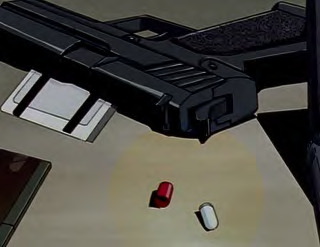
Kaji's final gift
The three characters representing the "Second impact generation" are Kaji, Masato, and Ritsuko. They are respectively entwined with Asuka, Shinji, and Rei throughout the characters' developments. Both Kaji and Misato self-reflect on their own pain and suffering while observing Shinji's growth and passes on their "Will" to Shinji. This "Will," shared by Kaji and Misato, refers to the desire to understand the "Truth" and the motivation to overcome any adversities standing in the way. Misato climbed up the ranks to become a high-ranked official of Nerv. Kaji became a spy acting for multiple agencies and organizations.
Due to having chosen the more dangerous route, Kaji lost his life much earlier than Misato. Knowing his impending death, Kaji passed on the pieces of information to his unanswered questions to Misato through 'Physical intimacy.' In this chapter and next, we shall discuss Misato as a character and as a person who Kaji trusted solely and lovingly.

"Until the very end, Service, Service."
Katsuragi Misato
29 years old
Blood type: AB
Height: 163cm
Weight: 47Kg
Three Size: 33-23-32
Considering her diet and drinking habits, it is a wonder how she manages to maintain such weight and proportions. As the Nerv operations bureau's leader, she was a Captain at the start of the series and was later promoted to a Major. From her rank insignia and the information from Evangelion development documents, we can see that she is from the "Japanese self-defense force." As a young girl, she was caught in the Second Impact, and this incident left a large scar under her right breast; she seems to associate the scar with painful memories. She is the daughter of Dr. Katsuragi, who lost his life in the same second impact while saving her life. This act of sacrifice indirectly provided the reason for Misato's eventual employment at Nerv; the need to find the "Truth" and revenge against those that caused her father's death.
She moved into the third Tokyo city shortly before Sakiel's advance against the city. She became the Ikari Shinji's guardian after the battle. To her, it could have been a fulfillment of a desire to build an ideal family life, one she never had as a child. For the same reason, she takes in Asuka and, along with Penpen, forms a happy cohabitating unit of 3 human 1 bird family.
The house that she lives in was provided for her by Nerv and is large enough for three people to live together without much contestation for space. To touch on Penpen for a moment, he is an animal mascot sketched out by Sadamoto following Anno's request for an animal character to brighten up the show's atmosphere. The concept of a "Hot spring Penguin" is fictional. He eats human foods and drinks beer. Inferring from his human-like diet and ability to view TV or read the newspaper, we can guess that he was born from a mutation or a lab experiment. The backpack he wears on his bag is theorized by some to be a miniaturized fridge to keep him cooled. Due to security reason, he is sent off to live with Hikari (Shinji and Asuka's classmate) and makes his final appearance in the "Omedeto" Scene,
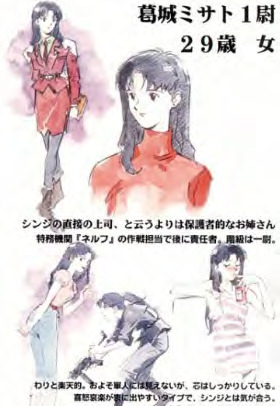
Katsuragi Misato in the development phase.
Misato is one of the rare characters whose design has not changed from the planning phase of the series, and on a side note, Anno was a big fan of the sailor moon series. Rei's name was inspired by Hino Rei (Sailor Mars). The design of Misato was based on the image Anno had of Usagi (Sailor Moon) as an adult. Adding to this point is the employment of the same voice actress (Mitsuishi Kotono) and Sadamoto designing their hairstyles to be identical. Furthermore, according to Sadamoto, Misato is a car enthusiast, and her room is full of related magazines and newsletters.
Returning to the topic, just like Shinji, Misato is a character who was designed with careful detail. According to Anno's production declaration (What is it that we are trying to make?) Similar in vain to Shinji being the child at the center of the Third impact, Misato was conceptualized to be the adult who was once at the center of the Second impact. Furthermore, both are inept at creating meaningful social bonds and are afraid of being hurt by the other. Lastly, they are both not used to communicating their needs to the people in their lives.
The difference between the two is that while Shinji feared interaction and ran away from the other, Misato made surface-level interaction with the largest number of people while hiding her true self under a mask. While Shinji's actions are understandable as he is only fourteen and made to shoulder an adult's responsibility, Misato is presented as a juxtaposition. Misato is presented as a child putting up an adult's veneer, showing her immaturity even as she is nearing her thirties. Asuka, who was acquainted with Misato during her service in Germany, described her lifestyle as 'Hypocritical.'
As we have discussed in the previous chapter, Kaji wore an irresponsible adult's mask to hide his serious side in pursuit of the Truth. In contrast, Misato wears a serious and bright adult mask to hide her cowardice and weakness. This would have worked against those that interacted with her on a surface level. However, it would have had to come off eventually, making it impossible to hide from people she lived with. This gave Shinji the perception of Misato as a 'hypocrite,' making it easy for him to reject her kindness and run away from her house.

Furthermore, when she lost Kaji and lost all willpower to put up that front, she could not care for the children physically nor care for their mental wellbeing. Concerning this, Asuka began closing herself up from Misato due to her jealousy for Kaji. Asuka also loved Kaji to the point she attempted sex appeal but was rejected for being "too young."
In episode 15, Asuka learns of Kaji's true feelings and begins feeling defeated, resulting in her bearing fangs against Misato. When her synchronization levels dipped below Shinji's in the following episode, her confidence in herself began to bottom, and Misato was in no position to offer help.
When Kaji began a more intimate relationship with Misato, whom Asuka perceived as mentally immature, Asuka was lost and began to distance her feelings from Kaji. Asuka's heart was broken, and there was no adult she could rely on. This point about Asuka will be covered more in later chapters.
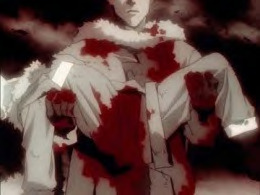
Dr. Katsuragi
Before diving deeper into the character analysis of Misato, we need to understand her father, Dr. Katsuragi, more. He was a member of the Gehrin and the first person to theorize the working of the fruit of life; the S2 engine. The 'Super Solenoid theory (S2 theory)' first theorized in 1999 attempts to explain the mysterious energy source: the 'infinite spiral energy.' This being a fictitious theory, we can not go in-depth here. Still, for the sake of explanation, it is explained as a potential source of infinite energy that Dr. Katsuragi desired to use for humanity's good. Ironically and unfortunately, it was this theory that resulted in the tragedy of the second impact.
In the year 2000, the Doctor receives Seele's funding to form the Katsuragi expedition team. He leaves for Antarctica to prove his theory and perform the 'contact experiment' with Adam. While his theory was proven to be accurate, he losses his life from the 'eventual second impact. Our dear old Keel described the Doctor demeaningly, to quote, "The type of man who was blinded by his passion and unable to see reality," this statement is accurate, according to Misato. This makes him a figure similar in character to Gendou, someone whose work always came before all else, even his family. Causing Misato's mother to always cry tears of loneliness.
Misato understood the impact her father's absence had on the household. This resulting in the pressure to be a good child to please her mother. This leads her to refute others' descriptions of him as 'Kind and sensitive,' calling him 'weak and childish'; as someone who was irresponsible to his family and ran away from responsibilities. Misato's mother eventually divorces him, and she welcomed this separation. It seems that Dr. Katsuragi was shocked by this incident; Misato described it as getting his 'just desert.'
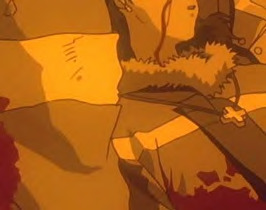
The cross: Dr Katsuragi’s memento
But of course, we have to answer one question regarding Dr. Katsuragi's affection towards his daughter; why did he bring Misato along to Antarctica in 2000? Since there is no mention of her mother in the series, we can infer that he gained custody of Misato after the divorce, thus being her only guardian. Yet to bring a young child to Antarctica was nothing more than putting her in danger. While he did not know of his impending death, bringing his daughter to such a place was downright irresponsible. While there is not enough detail about this, bringing Misato for the expedition might have been his way of showing affection. An imperfect way to express his love for her.
Here, we can draw a parallel with Ikari Yui's actions during her contact experiment. Perhaps the reason why the Doctor wanted to show Misato the contact experiment was the same as the answer Yui gave to Fuyutsuki; "To show this child the possibility for a bright future." And like the Ikaris, Katsuragis also separated in a tragedy. A tragedy for everyone involved.
Looking at the second impact scene, we can observe the Doctor covered in more injuries than Misato. This is likely due to him shielding her from harm using his own body.
With all of his remaining strength, he hoists Misato into an evacuation capsule. His face is covered in blood, and tears roll down his cheeks as he put his cross necklace around her neck. He draws his last breath. This necklace symbolizes the Doctor's love. The love for his family. And the love for humanity. He instills it in the cross and passes on all that he held dear to Misato. She now has to protect herself. But with the cross, the Doctor's desire to protect humanity also gets passed onto her. A burden too big for a little girl to bear.
Even though she claims to dislike her father, Misato is to be confused about what to feel about him; he risked his life to protect her after all. The biggest reason she is at Nerv and fighting the angels is likely to remember him and continue his legacy. Thus, the necklace is a protection charm and emotional support for Misato. We can see this when she desperately grasps the cross as Zeruel is about to shoot its laser.
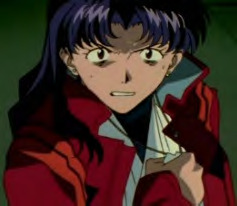
The cross in her hand
To Misato, the reason for her battle against the angels has less to do with the desire to protect humanity. She fights, as Ritsuko points out in episode 12, as a form of revenge. She admits to this fact in episode 15 during her conversation with Kaji. This is the reason why she takes on near-improbable strategies based on her 'gut feelings.' Especially in episode 12's battle against Sahaquel, the likelihood of success was 0.00001%. The subtitle for this episode is 'Don't make others suffer for your personal hatred.' This perhaps was something Ritsuko (or even Misato herself) was thinking deep down.
Yet to chalk all of this up to a simple desire for revenge is reductionistic at best. The cross in her hand was concurrently the unfulfilled love Dr. Katsuragi had for his family and also the hope for a brighter future for mankind. It was also a Cross, the symbol of the weight of responsibility, and it was what she stood for.

Various iconographies of crosses in Evangelion

The beginning of the universe?
Touching on the cross as we conclude this chapter, we are bombarded with its iconographies across the series. The most notable being the flash of light produced when the angels die. Seeing that this is observable during the third impact, it perhaps symbolizes the soul exiting the body. Another memorable cross is the one we see flashing during the opening sequence.
In the production commentary, the blue dot at the very start of the opening, which expends out in a circle and into a "red gas," is revealed to represent the big bang and the start of the universe. This is followed by the crosses that make up the transition into the title screen, the same kind of visual directions used for the in-episode eye-catch.
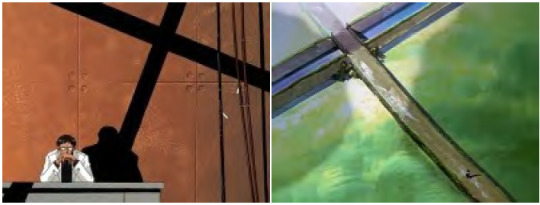
Beyond the surface-level representations listed, there are many more hidden references to this iconography. In episode 21, after Yui's absorption into Unit – 01's core, Gendou's shadow carries a gigantic cross. The object casting this shadow is not shown as it is only a symbolic representation. It represents the responsibility that he will carry, One that Yui used to carry and Gendou perverts. The responsibility to forgive humankind's original sin. In episode 4, when Shinji runs away from NERV, he walks down a long path shaped like a cross. This symbolizes the heavy responsibility that he is Fated to carry. That he is destined to be burdened with.
As Anno has put it, Evangelion is like a puzzle to be pieced together. There are many more such scenes, but I will leave it as it is for your enjoyment of discovery.
TBC Chapter 23 Katsuragi Misato Part 2 Dear Shinji, this is my Truth.
#Neon genesis evangelion#Evangelion#Eva#End of Evangelion#Nge#Nagisa Kaworu#Lilith#Sci-fi#Ikari Shinji#Soryu Asuka Langley#Asuka#Ayanami Rei#rei#Anno Hideaki#Katsuragi Misato#Kaji Ryoji#Anime#Analysis#Review
122 notes
·
View notes
Text
2021
youtube
It's been roughly a year and a half since the start of the Covid-19 pandemic here in Indonesia, and I've recently been trying to understand where I'm at. Not physically, as in physical space, but mentally and probably existentially. What is the state of my mind? I am aware that I've become somewhat bitter, my late nights are sometimes riddled with anxiety for what the next day may bring and reoccurring personal-collective grief has at times, and recently more often than I would like to admit, numbed me.
This may probably be my mind's automatic coping mechanism seeing all this death mainly as a result of how my government has failed us, its citizens, especially during a time of crises. And I really need to stress this point: how my government has failed us Indonesians during the times we need it the most and I very much believe that it is because of this why many of us Indonesians are in constant misery and haunted by that feeling of despair. If chronic physical pain causes constant daily anguish, I am not surprised if chronic physical and mental pain caused by structural violence causes persistent misery as well.
I'm somewhat fortunate in this regard, I'm grateful that I've learned ways to keep my sanity in check. My contemplative practice is key for me. Honestly, I wouldn't have gotten far in life without it. I have many people to thank, but Art Buehler especially, my former professor in esoteric contemplative/meditative practices who reminded me and pointed a certain possible direction of where I should head when I sense a lost in my life's direction, is one those I should thank the most. I know this seems like an individualized response to structural oppression, and I don't intend to paint such a picture, but I do believe we need some kind of mental stability to keep on going. To survive if not thrive.
Art sadly passed away in 2019. I received an email about his passing. And come to think of it I never really did allow myself to properly grieve for his passing. I don't know why. To be told through a short concise email that someone you cared for died, without having the opportunity to properly say goodbye feels like that person never really passed away. It is horrible way to end relationships. A sudden cut, nothing finalized, and since goodbyes are relational, now nothing can really ever be concluded. I have to make amends with myself and only with myself. If I said goodbye yesterday, or if I say goodbye today or perhaps tomorrow, will it ever be enough for me?
youtube
Life is individual yet also relational. It's good to have friends, family, people that care for you or the odd mix of all three to get you through life. So although I have these array of tools to possibly help get me through life but if the people whom you look for some kind direction is no longer present, I'm just not sure for how long I can maintain it if I'm doing all this by myself. Will a breaking point come to me?
The mind is a fickle thing, and the mind is as strong as its habits. Bad habits, bad mind. Good habits, good healthy mind (no habits, no mind?). They also say that things that might happen, will indeed happen. It is just a matter of time. If so, how will I break? To what extent? For how long? What will change? What will I lose? Will there be something renewed? Will I come out the same person? Will I come out changed but for the worst?
This is one of the things that worries me. That certainty of uncertainty. The certainty of breaking, the uncertainty of when and of its form. Will I explode in sudden exasperation, engulfed in madness? Will it be a quick balloon pop yet a slow descend into meaninglessness? An unabashed diatribe rant towards someone I care? Something that's just a twitter post away from me on actually doing it. Will this be an opening, an opportunity for 'satori', a sudden lift of the 'veil', bringing about comprehension and understanding of the true nature of things? Questions, questions, questions, not much when it comes to answers, is all I have for now. To be hopeful is hard these days and with the wavering hope, very much coming and going like waves, it has become incredibly hard to even retain any semblance of kindness. That is something I do not want to actively become a habit of. Without hope, comes the cold embrace of fatalism that many on the 'left' are guilty of. Clutched by fatalism, empathy becomes harder to come by. I've seen it, and I have felt it.
I know that my eroding sense of hope is connected to my personal dreams. Specifically how it has become very hard to actualize it. Rara and I never really planned on staying in Indonesia for long. I was confident enough, a bit too confident come to think of it, that we will be out of Indonesia by 2021 the latest. A mere 2 1/2 years after our last stay in New Zealand. The plan was for me to continue my studies, getting into a Ph.D. program and of course a scholarship. That was our ticket out. Hoping that we'll be back to our old routine in Wellington, in and out the university's library, my head in books, loving our 'flatwhites' while regretting having too much of it, the usual stint doing some university tutoring, community organizing stuff, lazy gardening, out and about on the weekends tramping around Wellington and if Covid did not happen or/and maybe if my government handled things much, much better I think that would've been the case. Or at least I constantly would like to imagine that would be the case.
youtube
Yet here we are still in Indonesia, me struggling to do my Ph.D. through this wretched distant learning, initially in the comfort of my home yet steadily devolving into cabin fever. And Rara with her own struggles trying her best to get back on her feet as an aspiring musician. None of it is going as well as we had hoped for. All this while juggling trying our best to keep ourselves safe and our families and friends safe. Both of us have become direct witnesses how challenging this has been, physically and mentally. Both of us slowly grappling with the continual kick in the gut, the never ending structural absurdity, violently absurd.
That slow grueling realization of how fragile our lives are. Not just existentially. It is existentially precarious yet at the same time understanding that precariousness in many of its aspects is structurally and politically maintained. It is this political construction of precarity, which Isabell Lorey elaborates in her book State of Insecurity: Government of the Precarious, that angers and saddens us the most.
Lorey provides a nuanced approach in unpacking and differentiating this thing called being 'precarious'. The three dimensions of being precarious: precariousness, precarity and then precarization. On precariousness, Lorey draw's on Judith Butler's conceptualization of precariousness which she sees as existential, relational and inevitable. I'll insert my existential philosophy and Buddhist values here, to help me see and more importantly accept the transient nature of life and that impermanence or change is the only constant. Our lives, our bodies are destined to die and wither away. We humans are fragile mortal beings. The loss of life, the loss of one's identity, the loss of everything that makes us, us is unavoidable. It's also a 'relational' thing, as in it is also a shared experience. Everyone will experience it. It is the great equalizer some say.
Then we have precarity. Yes everyone dies, but the process of dying or even the process of grieving someone's death is dependent on what Lorey see as the “effects of different political, social and legal compensations of a general precariousness”. Some die at young age due to starvation, riddled with poverty and disease and have nothing or no one to ease their pain, others die surrounded by family and friends in a well-cared for hospital. Some have days or weeks to grieve, others have to go back to work the next day as she or he have no luxury to stop working even just for a moment and simply grieve. To stop working even for a day draws some closer to the possibility of death for the person or those dependent on the person working. This is the inequality of dying and grieving due to our social hierarchies. How fragile we are, is dependent on those social hierarchies.
And last we have Lorey's third dimension, governmental precarization which is the instrumentalization of insecurity by the government. In other words, the government using the idea and the reality of insecurity as a tool or device to control its citizens. The calculated, deliberate attempt by the government in destabilizing our lives in order for us to be easily governed. Insecurity, be it real or due to perceived constructed fear of insecurity is an effective governing tool. The fear of being labeled "useless and lacking in contribution to the nation-state". The genuine insecurity of not being able to get a job due to the false understanding that it is simply a result of an individual's laziness rather than due to systematic government policies. The deliberate attempt in making our lives constantly insecure, constantly on the edge, without us initially knowing it and when we do come to understand, the blame is on us. It is normalized and it is internalized.
youtube
This is not simply a social issue, it is a deeply existential one as well. We Indonesians have very little to make us feel safe at the moment. Covid and the government's response to it has severely limited our movements and it's not simply physical immobility, but also an existential one, the inability to even have the imagination that our lives are actually "going somewhere", towards a forward direction. Perhaps some sort of minute incremental progress, but progress nonetheless. This imagined mobility is what Ghassan Hage calls as "existential mobility" and this immobility suffered by many of us is what he also calls as "stuckedness".
Turning an often momentary or the ephemeral nature of a crisis into something prolonged and perhaps even permanent is another part of the strategy of governmental precarization. Our lives or jobs are always on the line and again coupled with the sick prevailing idea that we only have ourselves to find the solution. The crisis is permanent, we don't know why but we've been told that way, if we fail to overcome it is because of our personal inabilities thus proliferating and intensifying this sense of stuckedness.
Forcing us to accept whatever solution the government-messiah presents us with in order to relieve us from this suffering. From labour laws that normalizes precariousness even more, to oppressive new laws that limits our desire and ability to dissent, to including who or how our enemies are defined, easily accepting who is to blame for all this insecurity we are all suffering.
Be it the long dead Indonesian communists, the Chinese Indonesians and the racist perception of them being "selfish and greedy", the Indonesian Islamists - the kadruns and their conservatism, the "foreign forces" whomever they may be constantly trying to take over Indonesia, anyone or anything is to blame. Anyone but the Indonesian government and its affluent patrons. Insecurity and the fear that rises from it renders many of us easily governable and compliant.
This governmental precarization and this 'stuckedness', which Hage sees no longer as a possibility that may or may not happen but an "inevitable pathological state which has to be endured" is how Rara and I feel at the moment.
youtube
Rara and I feel our lives are going nowhere. We feel that our lives are stuck, constantly rotating in a hamster wheel trying our best to overcome our precariousness. No progress, no forward movement, no growth, just trying our best to survive from this sustained uncertainty. It's an awful feeling, paving way to existential dread. We are very much looking forward to moving back to New Zealand as soon as possible but with the conditions right now, that is something I can't even dare to imagine.
And although I am grateful that the weave of our privilege with at many times just pure sheer luck has kept us alive and physically well for the time being, we both now realize that we have hit a proverbial concrete wall here. Adding to the already precarious nature of life here in Indonesia, our line of work as a fledgling social science academic and aspiring artist and what Rara and I aspire to do socially, what we aspire to become, easily ends in stagnation if we intend to continue to live our lives in Indonesia. (I want to direct you to Social Science and Power edited by Vedi Hadiz and Daniel Dhakkidae to get the gist of what I'm trying to get at here.)
This is a hard pill to swallow, harder to write and even more so to act upon. I am existentially tied to Indonesia, my family and friends are here, my father is buried here and so will my mother. Memories of the distant past, the colloquial language when shitposting on social media, my mind and body have been shaped by Indonesia in ways I possibly do not even fully realize. This is why I oscillate between guilt towards others and guilt towards the self. I feel guilty for simply having an exit strategy when many others don't, I have the luxury of choice. Yet I also I feel guilty for feeling guilty about this, as it means I am also neglecting the well-being of myself, now and in the future. I need to work on this and find my bearings, being stuck in a guilty limbo won't get me anywhere.
And the future is far from stable, I wonder what is on the other end of surviving this pandemic? There is so much collective grief, collective anger and of course personal anger. All this will amount to something, I'm sure of that. Although I don't know what exactly, I'm not entirely confident this something will be good. John Keane's new book 'The New Despotism' comes into mind.
What do I personally do with all this anger? I’ve noticed how anger, especially when it is on the verge of hatred, morphs itself and easily descends into madness, into aggression and often showing itself, unawaringly to us, when the act of expressing anger happens. Your mind becomes instantly clouded, ending in mindless action. This inability to have control over oneself terrifies me. I already have so very little semblance of control over life in general at the moment, if I truly have no control over myself whatsoever, what then do I have?
And I wonder if it is a waste of time asking these pseudo-intellectual questions? I don't know, yet I do know I live in a society where it hones aggression and hostility, whether it be in physical and digital spaces, and I would like to draw myself away from all this at the moment before I transform myself into something I do not wish to be. Anger I can fully understand, and it is needed and useful. Yet to actively transform it into deep blinding hatred and sustain it daily, is something I feel psychologically destructive for me and I'm trying my best not to go on that path.
I rarely update this blog I know, but this blog has always been used as a personal chronicle of how much I have progressed, digressed or both. And I needed to write all this, because I've never been this least sure of what my life should be like and where it should go. I know I am not alone at this. This pandemic has destroyed the lives of many, our futures, our dreams, our sources of love and I hope that anyone of you reading this finds a way to get through it, doing anything you can do day in, day out.
I'm not sure it if amounts to anything. Maybe it won't, maybe it will, or maybe it has but maybe we just can't see it. All I can personally do for now, is to hold on to these 'maybes', and maybe, just maybe I'll get through this too.
youtube
“Where must we go...
We who wonder this Wasteland
in search of our better selves?”
- The First History Man, George Miller
35 notes
·
View notes
Text
超高校級の英雄 V3: Danganstuck Classpects V3
Okay, okay.
Enough waiting around; let’s get this up and ready to go.
These are obviously just my own opinions on things, and as such are very closely tied to my own personal interpretations of both the V3 characters and also of the classpects themselves. For clarity’s sake, I based the aspect rationalizations from the official lore here, and I used the MSPA wiki for direction with the classes.
Just as a quick note, I used some of the FTE info (which is debatable in its veracity) for some of the assignments. Sorry, gotta work with what I have to work with. Also, if anything is expanded on in Homestuck 2, I have no idea, as I haven’t read it (or the epilogues, for that matter).
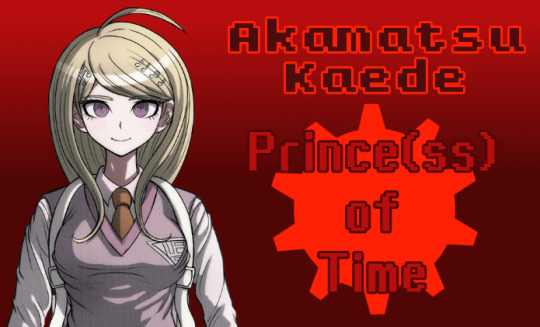
Akamatsu Kaede Prince(ss) of Time Derse Dreamer The Land of Sharps and Flats
Going off the canon description of Time, it makes perfect sense for Akamatsu. She’s goal-oriented, wants to skip to the credits, and would rather take a leap of faith than wait things out. To say nothing of the strong associations between Time and music. I went with Prince for her as a class since it’s the destroyer class--Akamatsu very literally destroys both Amami and herself (and her goal of getting everyone out alive) thanks to her own impatience in wanting to stop the one responsible for the killing game. I had her sleep on Derse since she’s supposed to be a bit of a protag subversion in that she hatches a literal murder scheme. Her equivalent of the Beat Mesa is a big metronome.
I also have an alt land name for her in The Land of Ninths and Eighths to reference the time signature of Claire de Lune (which is 9/8).
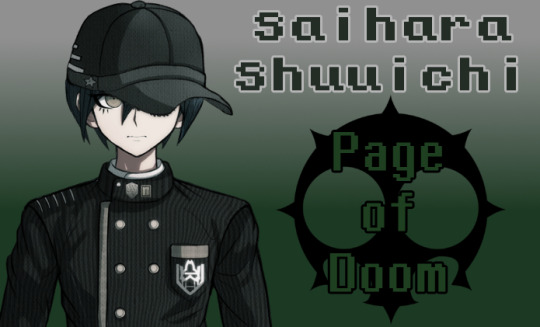
Saihara Shuuichi Page of Doom Prospit & Derse Dreamer The Land of Glass and Fingerprints
I considered making Saihara a Rage player at first given how the ultimate conflict is (supposedly going to be) solved in Chapter 6, but the description of Doom players as being commiseraters rather than healers really stuck out to me as appropriate for Saihara. Of all the characters in the game, he’s one of the few that doesn’t actually push anyone to heal, and his ultimate gambit in the 6th trial is to counteract the audience trying to self-medicate with catharsis at their expense. He takes a while to come into his own, which is the signature trait of the Page class, too. As a Doom player, he dreams on both moons, which for reasons I can’t quite articulate just clicks for me. The glass in his land name references not only magnifying glasses but also mirrors, since his is very much a journey of self-reflection.
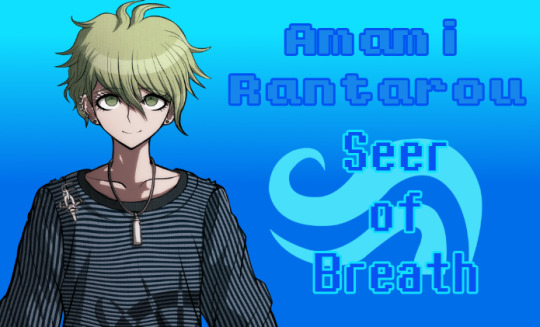
Amami Rantarou Seer of Breath Prospit Dreamer The Land of Sails and Nail Polish
I really like what I came up with here for Amami. Breath is linked pretty strongly to his FTE reveals about how his desire to explore led his sisters to disappear into the ether (and changed his direction in life), and the angst he feels over wanting to reunite with his sisters hints at his trouble with bonds (the Breath inverse Blood’s territory). I incorporated the boat stuff into the theme with the idea of sailing for his world name, while the nail polish is for his sisters and that extra scene with Akamatsu. I went with Seer as the class since Amami Knows Things, and there’s that bit about Seers “having a strategy guide in their head” that I wanted to be a callback to the special map and the fact that he’s the Shogo Kawada of this operation. Prospit as the dream moon just felt right, so there it is.

Iruma Miu Thief of Space Prospit Dreamer The Land of Caulk and Nuts (and Frogs)
I don’t care if you have to have Frogs somewhere in the Space player’s land name, I will stand by that pun! So Space is all about creation and seeing the bigger picture, and to me that jived with how Iruma is an inventor. While Time is deeply linked to music on a conceptual level, Space is linked to nurturing, including growing plants, raising animals, and parenting. The Space and Motherhood parallels fit well with Iruma’s canon aspirations and goals. I went with Thief because Iruma is very much out for Number One, and wants to hog up all the creation ability for her own ends. Prospit dreamer because she’s the type.
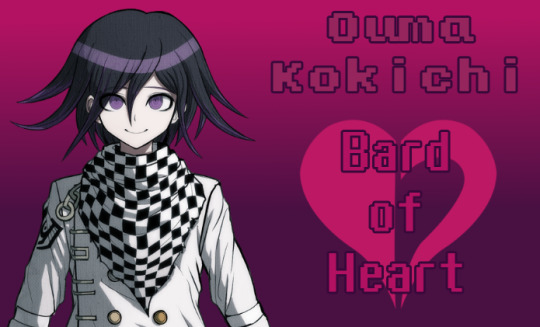
Ouma Kokichi Bard of Heart Derse Dreamer The Land of Kings and Horses
There’s a lot you could do with Ouma, and I’m sure that plenty of people peg him as a Void player because of the lying. For me though, I read Ouma has being primarily concerned with his own identity, and how he’s perceived by others. Fractured senses of self are a Heart concept, after all, and it seems that Ouma likes trying on identities to see which one ultimately fits him best. I made him a Bard because they’re unpredictable and all about helping or hurting a session in random turns, but also because Ouma himself is allowing his own identity to be destroyed thanks to his paranoia and inability to let anyone get close to him. He dreams on Derse with all the other schemers, and I went with a name pun for the planet that can also function as a chess reference (ala his bandana and his 5d chess approach to life).

Kiibo Sylph of Mind Derse Dreamer The Land of Shells and Ghosts
Since Sylphs are healers, I wanted to have Kiibo in that role, since he’s usually trying very hard to smooth things over and fix problems. I went with Mind for him for a few reasons: one is that Kiibo’s self-identity is subsumed by his “inner voice” that later turns out to be audience suggestions, meaning that he’s healing things through the choices of others and doesn’t have as much of a Self as it were. Another reason is because I made Naegi a Mind player and Kiibo is clearly meant to be a bit of a callback to him (up to and including the fact that Naegi very much functions as an audience insert in the first game). I made Kiibo a Derse dreamer because he literally hears the whispers of the audience members telling him what to do. The land name was me having a little fun and poking at his aspect a bit.
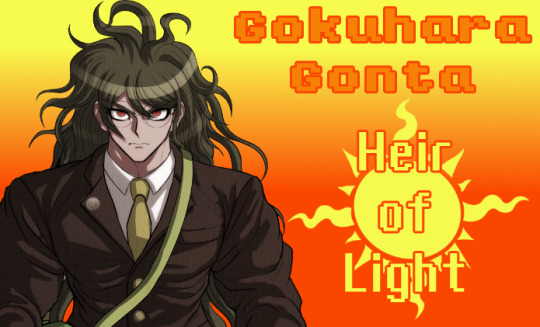
Gokuhara Gonta Heir of Light Prospit Dreamer The Land of Pins and Wings
Light is all about knowledge, and Gonta has, while specific, quite a lot of knowledge. He likes learning, and is open to new information to re-evaluate what he knows. I made him an Heir since the speculation is that they are subsumed in their aspect, and Gonta is very passively knowledgable. He often offers helpful suggestions based on things he just happens to know, for instance, and what ultimately undoes him is Ouma showing him the “truth” of things, which Gonta doesn’t even think to question. He’s a Prospit dreamer who’s been awake for awhile, unwittingly watching the clouds for signs, and his land name is a reference to pinning butterflies into a collection.

Shinguuji Korekiyo Mage of Light Derse Dreamer The Land of Scrolls and Masks
Meanwhile, on the other end of knowledge for knowledge’s sake, we have the other scholar, Shinguuji. Unlike Gonta, he’s actively out there seeking knowledge, rather than being drawn to it, and his motives are undeniably selfish in nature, so I wanted him to be an active class (I’m assuming Mage is the active counterpart to Seer, shhh). Shinguuji uses his understanding of his field--humans--to progress his own goals and wants. He’s also smart enough to know what pieces of information to share and which to keep hidden behind a convenient zipper. Made him Derse because shemey as all hell, and I went with some general imagery for folklore for the land name.
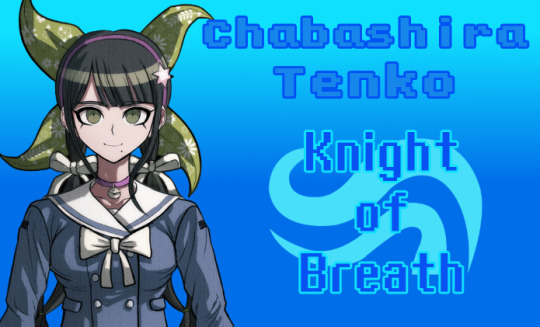
Chabashira Tenko Knight of Breath Prospit Dreamer The Land of Sweat and Flipping
I think we can all agree that Chabashira is probably not a Derse dreamer. Meanwhile, I chose her aspect for a couple of reasons: first, because aikido is generally about evading attacks which strikes me as a windy kinda deal, even if Neo Aikido is a bit different; second, because her central conflict in the game is about learning to let go of a bond she desperately wants to forge with Yumeno (which, again, is a Blood-related matter); and third, because flipping somebody would create a gust of air movement and that image made me laugh. I went with Knight for Chabashira, since the most common interpretation of Knight is that it exploits its aspect, and I think that Chabashira is able to exploit the various currents of influence (especially in Chapter 3) to great success. I also think that she exploits The Breeze to nudge Yumeno’s path out of danger by taking her place in the kagonoko ritual. The land name is the sweat of training in martial arts, and the flipping is not just about said martial arts, but also about being flung off a see-saw.
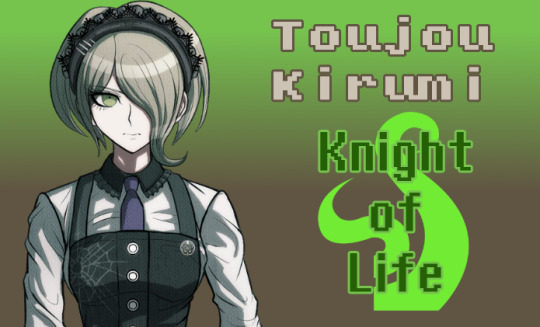
Toujou Kirumi Knight of Life Derse Dreamer The Land of Sticks and Carrots
Life players are generally known to be trying to fix everybody’s problems, whether they want that to happen or not, and if that doesn’t scream Toujou to you, I don’t know what will. I went with Knight again for the exploitation aspect of it, where Toujou uses her position as authority in the group to further what she believes to be the greater good (hedging my bets here since we don’t know if Knight is active or passive). She’s clearly a Derse dreamer, because even if she wasn’t schemey, she’s droll as fuck. Her land references the two main ways to motivate someone: threats and rewards.
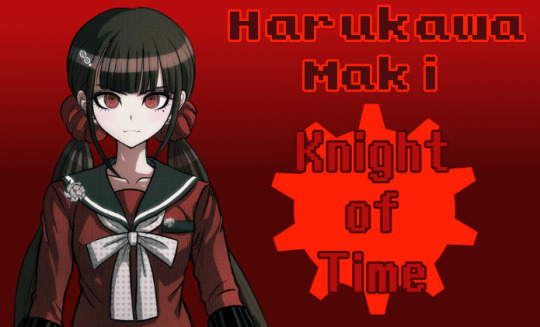
Harukawa Maki Knight of Time Prospit Dreamer The Land of Beans and Demons
I know, I know, but really, if you think about it, HaruMaki and Dave do kind of have a lot in common (and not just the fact that they have red eyes). The part about Time that fits well to me is that a Time player’s life is marked by strife and struggle, which HaruMaki has in spades. Like Akamatsu, she’s impatient and often acts rashly, in an attempt to cut out the middle man or advance what she thinks should be happening. She’s the last of our Knight squad, exploiting Time (or more broadly, destruction/entropy) to try and help out, such as trying to off Ouma or attack the Exisals head on. There’s also a bit on the Wiki that’s speculated that Knights often try to conceal their insecurities by acting tough, which is HaruMaki’s M.O. While she doesn’t have the music theme, assassination is very much about timing. I had her dream on Prospit because she’s not really a plans person, deep down, and her land name is a joke about her name/birthday referencing Setsubun.
HaruMaki doesn’t have a Beat Mesa equivalent, but she does have a tool specifically for causing a Scratch: a huge, unwieldy kantana.
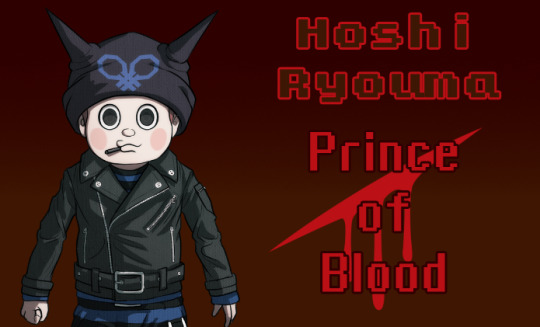
Hoshi Ryouma Prince of Blood Prospit Dreamer The Land of Grass and Clay
Here you go, anon, what you were waiting for. I personally peg Hoshi as a Blood player, through and through. He’s stubborn, values bonds with other people, can lead via inspiration rather than direct command, and feels grounded. I think he’s a Prince thanks to the fact that he ended up destroying the very people who meant so much to him, and in the aftermath continued to push people away and pre-emptively destroy any possible future bonds. He’s a Prospit dreamer because he can see flashes of the future, though he often doesn’t read them correctly. His land is a reference to different types of tennis courts.
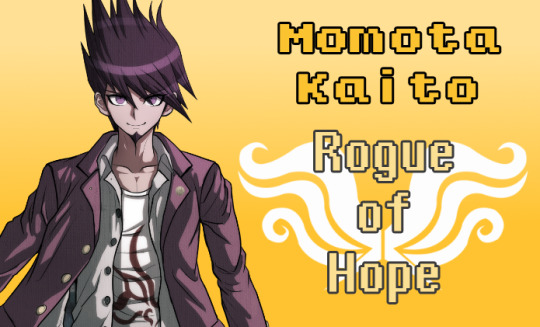
Momota Kaito Rouge of Hope Prospit Dreamer The Land of Wishes and Stars
The key part of a Hope player is that they can dream up a better world than the one that exists, and that can definitely be said about Momota. Like Jake, he’s a bit in his own head and immersed in his fantasy version of reality, where he plays the hero and is able to save everyone else. He’s somewhat gullible, to a point, and he’s the most superstitious of the bunch, showing how much stock he can put into the thing he believes. The sheer power of Momota’s belief is infectious, hence why I made him a Rogue--he’s out there trying to impart his sense of belief into those around him, for everyone’s benefit. He dreams on Prospit because of course he does, and I made his land name reflect literal space in conjunction with his talent, and to riff on that inspirational poster about shooting for the moon and landing among the stars.
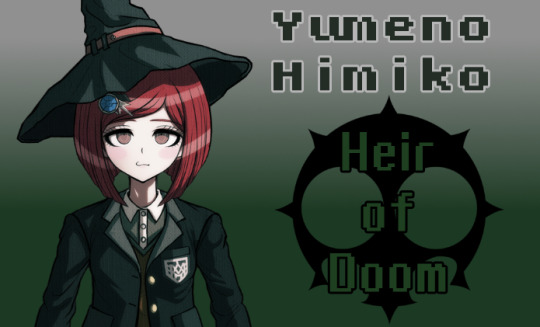
Yumeno Himiko Heir of Doom Prospit & Derse Dreamer The Land of Death and Magic
While most people who played V3 picked up on Saihara being depressed, not everyone has noticed that Yumeno also suffers from the same bleak view of the world. Similarly to Saihara, Yumeno is not a healer, or a doer. She’s here to sigh and complain and tell you that’s rough, buddy. Because of that, I can definitely see her as a Doom player. I made her an Heir, as one who is consumed by their aspect, since Yumeno is very much doom and gloom a lot of the time. She’s also subconsciously drawn to death, as she gets close to both Angie and Chabashira before their untimely demises. It’s through their deaths that she comes more into her own, hence why it’s also part of her land title (I don’t think I have to explain the other part). She dreams on both moons because Doom players are implied to do so.
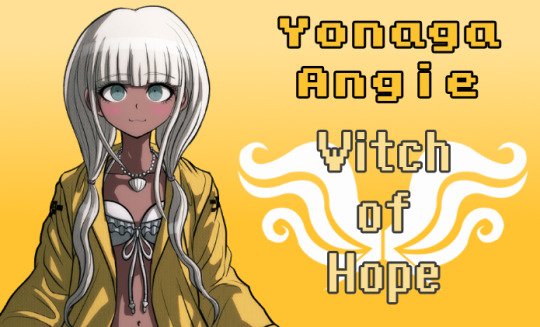
Yonaga Angie Witch of Hope Derse Dreamer The Land of Prayer and Idols
Like Momota, Angie has intense faith on her side; if Angie thinks it’s true, it’s true. She’s also similarly not looking at the same world as everyone else, instead seeing something slightly different and colored by her own beliefs. However, unlike Momota, Angie is not interested in helping others find their own faith, and would rather use the power of her belief for her own gain. Hence why I made her a Witch, an active class that manipulates its aspect. The other characters may not believe in Angie’s religion, but they sure do believe her when she tells them to sacrifice their autonomy for safety. I put her on Derse since her god could very easily just be a specific horrorterror, and the land name is connected to religion.
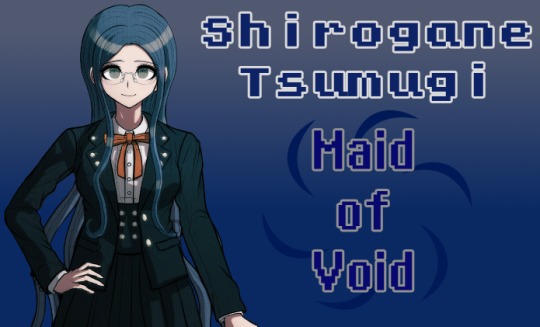
Shirogane Tsumugi Maid of Void Derse Dreamer The Land of Scripts and Swatches
I went through a lot of possible Classpects for Shirogane, including Light, Space, Seer, Heart, etc., but I think that this is what I’m going to settle on. Derse Dreamer because not only is she schemey, she’s listening to whispers of her bosses and the ratings, albeit in a less direct sense than Kiibo (what’s more horrorterror-y than a focus group!). Void as an aspect works well to me, since Shirogane is always going on and on about being plain and forgettable, about how she hides in plain sight, and even her talent is about becoming somebody else rather than herself. She’s also the one who in the end throws the “truth” into question, instead concealing it in favor of ambiguity. I went with Maid since one of the speculated interpretations is one who creates or creates through their aspect: she not only (arguably) erases the casts’ identities and memories, she does this in order to have “blank pages” on which to write the killing game’s drama. Whether Maid is an active or passive class is unknown, but if it’s active it makes sense since she’s using other people for her own gain, and if it’s passive, it could be argued that she’s doing it in service of Team DR or the audience.
Speaking of...
Bonus!
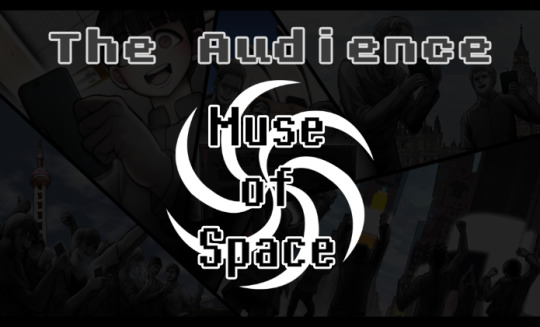
The V3 audience Muse of Space The Land Beyond the 4th Wall
I don’t like assigning Master Classes unless I have a really good reason, and here I think it works. The fans are the epitome of the “wait-and-see” model, and their crime as it were is their general apathy toward the very real subjects of the killing game. They’re all big picture and no important details or nuance. You can’t get much more passive than being an audience member, hence Muse class, yet it’s their desire to recycle the series over and over that leads to the killing game’s very existence (they’re also not too upset about letting the kids’ past lives be sacrificed for this act of creation). The V3 audience is collectively in the real world as opposed to the Medium, hence the “planet” title for them. In the context of an actual Sburb game, they’d likely be Exiles.
------------------------------------------------------------------------------------------------
Yeah, no Rage players in V3. I couldn’t find my notes the other night when I got home, so I just went ahead and reworked all of the classpects from there.
The Aspects were fairly easy to assign, but the Classes really had me scratching my head for a good long while. Maybe it’s because it can recontextualize the Aspect elements depending on what it is, or maybe it’s because we don’t have as much information about how Classes work.
Anyway, whew, that’s it! Hope you enjoyed!
50 notes
·
View notes
Text
(ok thank you so much @possumsunshine for making this big fat wayhaven detective questionnaire i had FUN doing it)
QUICK READ OF YOUR DETECTIVE
Name: lane m. wheatley
Pronouns: she/they
Sexuality: bisexual
Love interest: mason
Best friend: unit bravo all of them
Main skill: people
Secondary skill: science
Main personality trait: genuine
Secondary personality trait: easygoing
Why did they join the Wayhaven PD?: wants to protect people
Relationship with Rebecca: bad so bad laughably bad
Relationship with Bobby: ex
Verda or Tina?: verda
Murphy bite?: neck
Murphy’s fate?: captured
Rescue LI or Rescue Sanja?: mason she panicked
GENERAL
Name: lane marshall wheatley
Nickname: detective (affectionate)
Birthday: december 8th
Age: 27
Pronouns: she/they
Sexuality: bisexual
Hair color: honey blonde
Eye color: dark brown
Height: 5’1
Piercings: a few holes in her ears and her septum but she very rarely wears the septum ring
Tattoos: a rat on her left thigh, a stick and poke that says dunkin donuts on the inside of her left ankle
Clothing Style: smart. blazers and slacks. very shiny loafers. big bulky wristwatch. christopher moltisanti from the sopranos.
Apartment Style: dark. but fully furnished by bulk trash day
STATS
Personality:
Charming | Intimidating
Impulsive | Cautious
Sarcastic | Genuine
Friendly | Stoic
Easygoing | Stubborn
Traits:
Heart | Mind
Optimist | Pessimist
Team Player | Independent
Skills:
Main Skill: people
Second Skill: science/technology
By the Book | Bend the Rules
KEY DECISIONS
Reason for joining the Wayhaven PD: wants to protect people
Murphy bite: Wrist | Neck | None
Murphy’s Fate: Captured | Escaped
Rescued: Love Interest | Sanja
ROMANTIC RELATIONSHIP
Love Interest: mason
Why them?: ok time to be A Bit Much™️ but she immediately identifies herself in mason. like felix and nate are open and kind which she tries to embody, and adam respects her so long as she does her job which she understands and appreciates. she doesn’t understand or relate to any of them in a romantic sense. with mason she sees that ‘oh, he likes to hook up and flirt. he’s kind of grumpy but that’s fine i also pretty much exclusively only hook up and flirt. so that could happen.’
Bold, shy, or mixed?: bold
What were their first impressions of each other?: for lane, mason immediately pissed her off. she was very stressed out by the case and rebecca’s sudden appearance and adam’s attitude, so her patience was so thin and she just didn’t care about much beyond solving the mystery of the murder. she thought he might have seen her in a weak spot and pointedly ribbed her because of it so she was like “i literally just need to learn to ignore this man.”
for mason, it was a weird mixed bag, because he could pick up on lane’s reluctance to work with a team—especially rebecca’s team. with that impression in mind, he sees her cast all of her personal feelings aside for the sake of solving the case and protecting the town, and he relates to that instinct. other than that, he was generally annoyed that they had to work with her
What do they find attractive about each other, mentally or physically?: everything for sure but specifically their favorite features -
for lane: mason’s freckles and his long nose and hands. mentally, it’s his honesty and sense of humor
for mason: lane’s eyes, cheeks when she smiles, legs. mentally, it’s her open mindedness and protective nature
What do they do to spend time together?: they go on walks, lane tries to find mason’s favorite music, they watch movies, they go on long drives, they sit at the lighthouse, they watch sunsets together, they stare at the moon
What is their favorite memory together?: they make a lot! the first time they quietly sit together on the roof of the warehouse becomes especially important to them both over time
What are their love languages?: touch, quality time, lane is half in/half out on words of affirmation
How do they handle being apart from one another?: ok deep romance mason feels the brunt of hypersensitivity with also the ache of loss so he mostly sulks and sticks to his room. lane kind of walks around on autopilot. not really realizing it, but definitely experiencing heavy brain fog and going home and berating herself for being needy but also crying
Do they argue? How do they handle arguments and disagreements? How do they make up?: they don’t really argue! mason doesn’t really think not to speak his mind and lane is very communicative and easygoing. they bicker when one of them ends up in avoidable danger, but it usually ends with a quiet “i need you to stay safe.” something w that sentiment
What does their future look like?: traveling and a lake house. staying with unit bravo through thick and thin. lane turns when she’s 29, and they stay in wayhaven until she turns about 45 and eyebrows start to raise.
Anything else you’d like to share: they do get married. it’s a very small and very private ceremony that doesn’t really matter much to either of them but conceptually being husband and wife feels very funny and novel and also just makes sense
BEST FRIEND RELATIONSHIP
Best friend: i cannot choose but for this instance i will go with nate
Why them?: they talk a lot about literature and food and music and lane bids on antique furniture for nate because he doesn’t know how to use ebay. it’s a very precious friendship for them both
What were their first impressions of each other?: lane is weary of nate because he’s so charming that she worries that maybe he’s TOO confident. it passes when he gives that exasperated vibe off over felix being overtly outgoing in like a “oh he’s the parent” kind of way. he also has this comforting presence and she worries that he assumes she needs to be comforted. nate is weary of lane because while he’d never assume that someone is incapable at first glance, lane looks like a stiff wind would blow her over and that she hasn’t slept in a year. also his first genuine sight and impression of her is this tiny person taking a coffee pot apart piece by piece and grumbling very angrily to herself.
What do they do to spend time together?: nate purchases period piece luxury furniture and sometimes it is not in the best condition so lane and nate restore old furniture together. they debate about shakespeare and different genres of music. sometimes they play together. they swap recipes and while nate doesn’t gossip much, he always listens to station drama over tea/coffee.
Anything else you’d like to share: nate is the first person lane talks to about becoming a vampire. she knows he has his own reservations and she needs to hear them. also lane, nate and felix paint each other’s nails every few weeks. adam has an open invitation that he cashes in maybe twice a year.
OTHER RELATIONSHIPS (Feel free to go in depth!)
Relationship with Rebecca: bad! they are strangers to each other and also very sad reflections of one another. rebecca makes lane feel so small without even trying
Relationship with Rook: rook was as beloved in wayhaven as lane is now, if not more so. she hears about him in stories that every adult in town seem to know. he’s her hero and she’s always a bit devastated that she never got to know him. lane had a crisis of identity in her sophomore year of college and suddenly the stories she’d always heard felt like a calling to try to be good like rook. this ends up being why she declared her major in forensic science and started working towards becoming a detective like he was
Relationship with Bobby: it’s pretty much fine. neither of them were great when they were together and lane feels a bit bad now because she definitely used him. he did the same, for a few reasons. they’re okay now, but lane kind of feels kind of weird about the 8 months they dated.
Relationship with Verda: they are science best friends. they drink wine on the porch on summer nights, and lane babysits the kids when sol and eric need a night off
Relationship with Tina: very close. your best coworker friend who you start spending time with outside of work and then you realize that you are almost spending all of your time together with them actually. lane’s spent the last two years worth of holidays with the ponames
Relationship with the Mayor: not great! she’s very ‘by the book’ but always takes the chance to snark him. used to egg his house as a teen
Relationship with Capt. Sung: she sees him as a weird general manager at work and can be fine with small and idle chatting when they run into each other at town functions
Relationship with Haley: haley and lane hooked up a lot when lane and bobby broke up. they were band kids in high school together and it’s a very important friendship for lane
Relationship with Elidor: she is so comforted by this fae man. they talk science, they chat about personal dreams, huge hugs.
Relationship with Tapeesa/Vieno: lane has a friendly relationship with vieno! they call her buddy and she internally is like “i am! i am your buddy!”
Relationship with Unit Alpha: dunks on maaka for making fun of nate and adam. they’re pretty blunt and open and she likes that energy a lot
Relationship with the Maa-alused: a lot of guilt over them losing their home. lane gets the vibe that falk was flirting but she didn’t want to assume but also she was into it. devastated by the fact that she could have saved sanja if she hadn’t let her feelings cloud her sense of logic.
Do they have any other important relationships, past or present? (Relatives, friends, etc.?):
this is. a lot. (CW death and vehicular trauma) there was a boy who lane grew up with, who lived in the house across the street from her childhood home. by far, her best friend. they started dating freshman year of high school, and ended up in the same university, still together. lane was a comm major until her sophomore year and the two of them started a band in high school that became the band that lane was in for years.
in their sophomore yr of college, he proposed and lane said yes, of course, they had NO plan or any idea outside of the band of what they wanted to do for the rest of their lives. that same year, they ended up in a car crash and he did not make it. this is what triggered lane to kind of lose a lot of her sense of identity. she found comfort in stories about rook and decided that—with no direction, who would be better to emulate than her hero? her partner’s name was david, they were soulmates and ya she still misses him
other than that, the two other guys that were in the band who she has not seen since the funeral. i have this idea in my head of writing the scene where they visit and meet unti bravo which would be entirely for me and my own little rat brain
PERSONAL BIO
Describe their personality: very laid back and open/honest. easygoing
Strengths: very detail oriented, can spot the faintest whiff of a pattern and connect dots with sparse evidence. emotionally driven to the point that she pushes herself beyond her limits to do a job well. very technologically savvy
Weaknesses: emotionally driven lmao cannot separate herself from a case once she’s started, feels personally responsible for everyone she could not save. bottles up her anger until she has no choice but to deal w it via crying.
Where in the world is their Wayhaven?: somewhere on the east coast. near a wawa
What is their personal history?: lane is a town stray. she had her house with nannies and agency babysitters who weren’t invested in her emotional growth and well-being, so her defacto family is uh all of wayhaven. neighbors, mailmen, friends parents, shop owners. she connects as much as she can with everyone in town. she drifts a lot between them, and after the accident she realizes that she would do anything to protect these people
If they weren’t a detective, what would their dream job be?: if rook were never a detective, lane would have probably leaned less on stories of his heroism. she probably would have stuck closer to her friends and tried to commit to making music her full time job
Anything else you’d like to share: she picked up smoking very young and it’s genuinely surprising to people that she has never questioned why she does it or that she’s never had any intention of quitting ever
RANDOM FACTS
Zodiac sign: sagittarius
Hobbies: furniture restoration, making music, walking, cooking/baking
Likes: a funky little bass line, marlboro menthols, giving piggy back rides, painting walls, being a lab tech and assistant for verda, sitting on the kitchen counter in the middle of the night
Dislikes: arguing, loud noises, when it gets too hot outside, when it gets too cold outside, when she catches someone in a lie and they continue to deny it
Drink of choice: black coffee w a little cinnamon mixed in the grounds
Starbucks order: 6 shot latte w soy
Favorite food: grilled eggplant
Favorite color: this color is called black bean it’s this
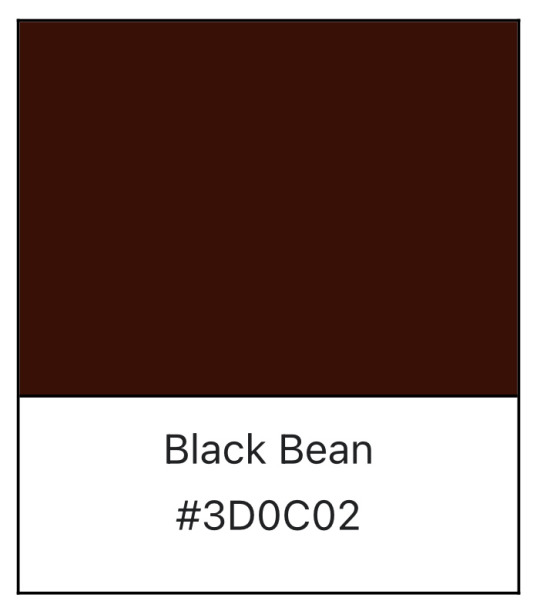
Favorite music: not to be annoying but truly all of it there is something she can enjoy in every genre but early 2000’s rnb and hard core punk probably
Favorite genre (and favorite movie/book/etc): she loves a rom com but also thrillers. her favorite movies are muppets treasure island and ratatouille
Favorite season: spring!
Anything else you’d like to share: her car’s name is Hank
#c: lane wheatley#not gonna put this in tags because it is mostly for me#smoking cw#food cw#drink cw#twc#aaaaaa thank u again for making this#cw death mention#cw vehicular trauma#alcohol ment#why am i nervous about posting this lmao
19 notes
·
View notes
Text
headcanon004. The Will of Grass ( name may change ) is a hybrid of Konohagakure’s Will of Fire ( through love, we can achieve peace ) and Iwagakure’s Will of Stone ( we must remain strong-willed and proud without giving into hate ), due to Kusagakure’s location being in the middle of the two greater villages. The Will of Grass states that where there is something important, one can endure any trial for the sake of protecting it. For people, it typically relates to the idea that when you’re protecting someone you love, you are capable of achieving extreme feats of willpower. For the village, it relates more to the tenacity of the village identity in how the Hidden Grass never fails to remake itself, time and time again. Karin herselfーthough she may not be consciously aware of itーis a carrier of the Will of Grass. It can be said more poetically as ‘as long as there is giving soil, cut grass will grow again’.
In regards to how this actually affects Karin, it gives her an uncanny good fortuneーalbeit it often succeeds bad luckーin brushes with death, motivated by a strong passion / love for someone or some ideal. Exempli gratia, her initial manifestation of the Mind’s Eye of Kagura coincided with an oncoming invasion to Kusagakure. Because she had someone to protectーparticularly her mother, Yuna, her father, Katsuki, her younger brother, Miyuki and, to a lesser extent, her sensei, Touyaーshe was capable of achieving a sudden and impressive feat, albeit due to the circumstances of her upbringing her warnings went, largely, unheeded until the last moment. However, due to her newfound ability she was capable of evading the attack, leading her to be the lone survivor.
This pattern continues throughout her life, although what she protects changes to adapt to new circumstances and connections: through cunning, she is among the few ( if not the only ) wardens to survive the ensuing chaos after Orochimaru’s deathーshe was motivated by a strong survivalist attitude that developed from the trauma of losing her loved ones and the resulting survivor’s guilt, vowing to never let herself die for a stupid reason as she wanted to protect the honour of her fallen family; she survives Sasuke’s betrayal in the battle against Danzo, her “last” memories being of the man she loved and her desire to see him smile ( thus wishing to protect his happiness ), though she would later be healed by Haruno Sakura; during the Fourth Shinobi War, she would sense Sasuke’s chakra weakening fatally and be inspired to once again activate a latent ancestral power ( albeit a lesser variant ), utilizing them in her pursuit to protect him, becoming punctured several times by the Wooden Statue, only to use her own chakra reserves ( through the Healing Bite technique that is, again, unique to her ) to heal herself from the mortal wounds.
However, this isn’t some guarantor of success nor some flimsy immortality: it is a will, which as shown in Naruto is a powerful thing, but nothing more. Sarutobi Hiruzen died for the sake of protecting and honouring the Will of Fire, but his death could arguably be interpreted as an act of the Will of Fireーthus, the Will of Grass is susceptible to the same rules. More-so, it rather just affects the quality of her character and is representative of her general life philosophy and the will to go on. It’s a source of strength, a burning point of faith.
She isn’t actually fully aware of the Will of Grass as a tenet until she revisits Kusagakure in her later travels, but conceptually it aligns rather nicely with her favourite phrase: “女の一念、岩をも徹す: a woman’s desire can pass even through rock”.
#headcanon#charadev#:3c#I've been sitting on this for ages like before my hiatus but#too lazy to actually develop the idea.. further..#but n e way.#:3
6 notes
·
View notes
Photo
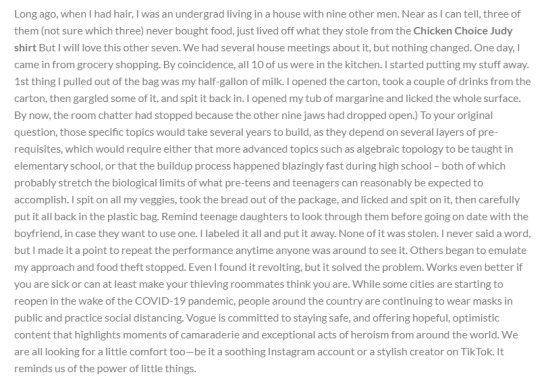
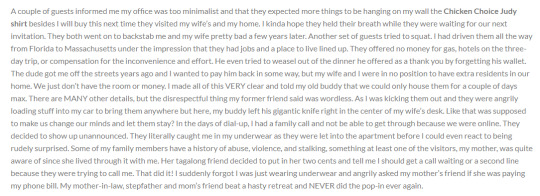
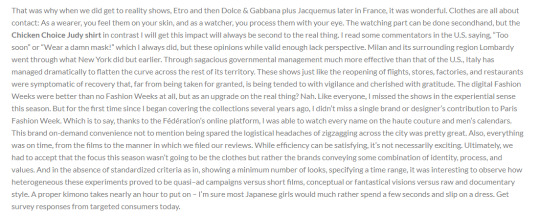

I?? I searched Chicken Choice Judy on google out of curiosity because it sounds oddly familiar like there’s a similar-sounding name and I found 4 websites selling the shirt design. But the descriptions on these pages are BUCK WILD??
Written version of the descriptions under the cut (very long).
[Begin ID
First image states: Long ago, when I had hair, I was an undergrad living in a house with nine other men. Near as I can tell, three of them (not sure which three) never bought food, just lived off what they stole from the Chicken Choice Judy shirt But I will love this other seven. We had several house meetings about it, but nothing changed. One day, I came in from grocery shopping. By coincidence, all 10 of us were in the kitchen. I started putting my stuff away. 1st thing I pulled out of the bag was my half-gallon of milk. I opened the carton, took a couple of drinks from the carton, then gargled some of it, and spit it back in. I opened my tub of margarine and licked the whole surface. By now, the room chatter had stopped because the other nine jaws had dropped open.) To your original question, those specific topics would take several years to build, as they depend on several layers of pre-requisites, which would require either that more advanced topics such as algebraic topology to be taught in elementary school, or that the buildup process happened blazingly fast during high school – both of which probably stretch the biological limits of what pre-teens and teenagers can reasonably be expected to accomplish. I spit on all my veggies, took the bread out of the package, and licked and spit on it, then carefully put it all back in the plastic bag. Remind teenage daughters to look through them before going on date with the boyfriend, in case they want to use one. I labeled it all and put it away. None of it was stolen. I never said a word, but I made it a point to repeat the performance anytime anyone was around to see it. Others began to emulate my approach and food theft stopped. Even I found it revolting, but it solved the problem. Works even better if you are sick or can at least make your thieving roommates think you are. While some cities are starting to reopen in the wake of the COVID-19 pandemic, people around the country are continuing to wear masks in public and practice social distancing. Vogue is committed to staying safe, and offering hopeful, optimistic content that highlights moments of camaraderie and exceptional acts of heroism from around the world. We are all looking for a little comfort too—be it a soothing Instagram account or a stylish creator on TikTok. It reminds us of the power of little things.
Second image states: A couple of guests informed me my office was too minimalist and that they expected more things to be hanging on my wall the Chicken Choice Judy shirt besides I will buy this next time they visited my wife’s and my home. I kinda hope they held their breath while they were waiting for our next invitation. They both went on to backstab me and my wife pretty bad a few years later. Another set of guests tried to squat. I had driven them all the way from Florida to Massachusetts under the impression that they had jobs and a place to live lined up. They offered no money for gas, hotels on the three-day trip, or compensation for the inconvenience and effort. He even tried to weasel out of the dinner he offered as a thank you by forgetting his wallet. The dude got me off the streets years ago and I wanted to pay him back in some way, but my wife and I were in no position to have extra residents in our home. We just don’t have the room or money. I made all of this VERY clear and told my old buddy that we could only house them for a couple of days max. There are MANY other details, but the disrespectful thing my former friend said was wordless. As I was kicking them out and they were angrily loading stuff into my car to bring them anywhere but here, my buddy left his gigantic knife right in the center of my wife’s desk. Like that was supposed to make us change our minds and let them stay? In the days of dial-up, I had a family call and not be able to get through because we were online. They decided to show up unannounced. They literally caught me in my underwear as they were let into the apartment before I could even react to being rudely surprised. Some of my family members have a history of abuse, violence, and stalking, something at least one of the visitors, my mother, was quite aware of since she lived through it with me. Her tagalong friend decided to put in her two cents and tell me I should get a call waiting or a second line because they were trying to call me. That did it! I suddenly forgot I was just wearing underwear and angrily asked my mother’s friend if she was paying my phone bill. My mother-in-law, stepfather and mom’s friend beat a hasty retreat and NEVER did the pop-in ever again.
Third image states: That was why when we did get to reality shows, Etro and then Dolce & Gabbana plus Jacquemus later in France, it was wonderful. Clothes are all about contact: As a wearer, you feel them on your skin, and as a watcher, you process them with your eye. The watching part can be done secondhand, but the Chicken Choice Judy shirt in contrast I will get this impact will always be second to the real thing. I read some commentators in the U.S. saying, “Too soon” or “Wear a damn mask!” which I always did, but these opinions while valid enough lack perspective. Milan and its surrounding region Lombardy went through what New York did but earlier. Through sagacious governmental management much more effective than that of the U.S., Italy has managed dramatically to flatten the curve across the rest of its territory. These shows just like the reopening of flights, stores, factories, and restaurants were symptomatic of recovery that, far from being taken for granted, is being tended to with vigilance and cherished with gratitude. The digital Fashion Weeks were better than no Fashion Weeks at all, but as an upgrade on the real thing? Nah. Like everyone, I missed the shows in the experiential sense this season. But for the first time since I began covering the collections several years ago, I didn’t miss a single brand or designer’s contribution to Paris Fashion Week. Which is to say, thanks to the Fédération’s online platform, I was able to watch every name on the haute couture and men’s calendars. This brand on-demand convenience not to mention being spared the logistical headaches of zigzagging across the city was pretty great. Also, everything was on time, from the films to the manner in which we filed our reviews. While efficiency can be satisfying, it’s not necessarily exciting. Ultimately, we had to accept that the focus this season wasn’t going to be the clothes but rather the brands conveying some combination of identity, process, and values. And in the absence of standardized criteria as in, showing a minimum number of looks, specifying a time range, it was interesting to observe how heterogeneous these experiments proved to be quasi–ad campaigns versus short films, conceptual or fantastical visions versus raw and documentary style. A proper kimono takes nearly an hour to put on – I’m sure most Japanese girls would much rather spend a few seconds and slip on a dress. Get survey responses from targeted consumers today.
Fourth image states: Around a decade ago, not long after he started his own label, Massimo Alba made a great mistake. A batch of shirts and T-shirts he was working on that had already been garment-dyed one color were mistakenly exposed to another. Speaking at his showroom presentation this weekend, Alba said: “It’s very interesting to me that so many good things start out as mistakes like this.” That accident was to Alba what the Chicken Choice Judy shirt moreover I will buy this mold-infected petri dish was to Alexander Fleming: a stumbled-upon eureka that led to a career-defining course of the investigation. This collection featured a series of softly tailored jackets, corduroy pants, and shorts, plus light cashmere sweaters that were hand-overdyed two, and sometimes three colors. It’s a process that led to variations in tone that included acid-trip floods of purple on purple to subtle bleeding of magenta across mustard yellow. Like most of Alba’s garments, these dyed pieces appeared at first glance conventionally prosaic. The more attention you gave them, however, the more their exceptional qualities became evident. Take a pale blue jacket, for instance, which at that first glance seemed passingly related to a surgeon’s scrubs. To the hand it was light and almost textureless in its softness: The fabric was a cotton mousseline developed for Alba by Albini. Long-sleeved, in a delicately mottled finish of washed-out sky blue, it made for an ideal mid-summer shake in pink, sleeveless, it was an impactful shirting second skin. Other interesting developments this season included a cotton pant named the Myles with acutely kinking stitched gather at knee-level on both legs and another handsome pant, baggy in white poplin, with patch pockets. A blue tropical weight jacket named the Lenny, after Bernstein, was Alba’s interpretation of a bohemian creative’s ideal piece of workwear. Collarless shirts in ripstop linen and button-up short-sleeves in terry were further finely effective coups de théâtre. Alba is a self-deprecating yet dangerous designer: Try just one carefully chosen piece and that’s it, you’re spoiled for good because nobody else quite compares. The museum in Prague where this portrait is held describes the ring on her first finger as the ring given to her at her wedding. It’s not comfortable. Maybe a lot of girls think that a see-through blouse can attract the attention of boys or they think that it will make her look much smarter. Meghan has no dress sense: no knowledge of fabrics, fit, styles that flatter, proper tailoring, Her father raised her in L.A. Enough said. Her idea of dressing for an event is “dress up” like a little girl dressing up as a princess. Shiny! Tight! Celebrity “fashion” not elegant, just flashy.
/end ID]
14 notes
·
View notes
Text
[Alright take-two on this damn post. First one got eaten by post editor right as I was ready to post. You see how long this is? Save to drafts, kids.]
I’m here to shove a manga on you: Ookami Shounen Wa Kyou Mo Uso O Kasaneru (The Boy Who Cried Wolf Also Told a Lie Today). It’s a gender bending romance. Despite how awful that probably sounds, it’s actually really fucking good and I do not say that lightly.
(No spoilers, this is all in the first chapter) A high school boy insecure about his intimidating face, Itsuki, has fallen for a shy loner girl, Tokujira, who does not seem specifically phased by his naturally scary face. So he takes a risk and confesses, but she turns him down brutally. Itsuki goes to his sister to lament his insecurities about his face, which he (more or less correctly) attributes as why he can’t make connections. To give him a new perspective on his appearance, his sister (trans btw) gives him a makeover while he’s sleeping and then kicks him to the curb of her salon - fully crossdressed. On his way home, Itsuki (♀) ends up bumping into Tokujira, and she mistakes him for a boyish girl. Under this misunderstanding, she asks "her” for a favor...
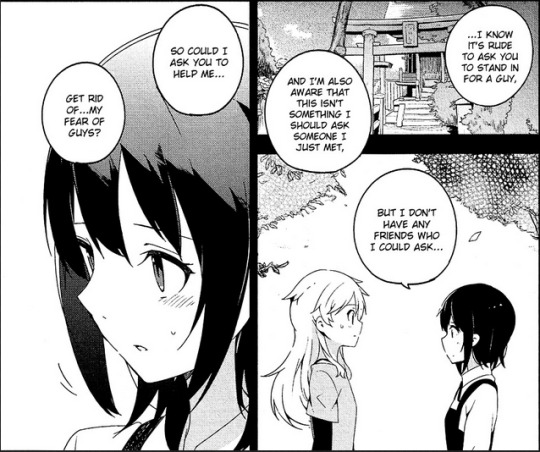
She has androphobia, and she has it bad. So much so she can’t even look at men without snapping violently or becoming physically ill. And Itsuki (♀) is just boyish enough to trigger her, but not enough to lock her down. So she asks for “her” help, to see if she can desensitize herself to her phobia. Itsuki’s in a bind for a couple obvious reasons, not the least being the guilt of deceiving Tokujira. But nonetheless, he genuinely wants to help her. So, he decides to continue crossdressing, diving into a lie that he soon finds he has no easy exit from.
I really recommend this manga. I cannot say that enough times. It is phenomenal, shattering tropes left and right in fun and interesting ways. Do yourself a favor and give this manga a try.
Personal feelings and meta analysis below the cut. It’s, uh, ungodly long, and will get very spoilery. But I will flag spoilers. And there will be pretty pictures?
(Also, no, I did not go into this planning to compare a manga about crossdressing to the abolitionist writings of Frederick Douglass, but reality deserves to be a bit absurd sometimes.)
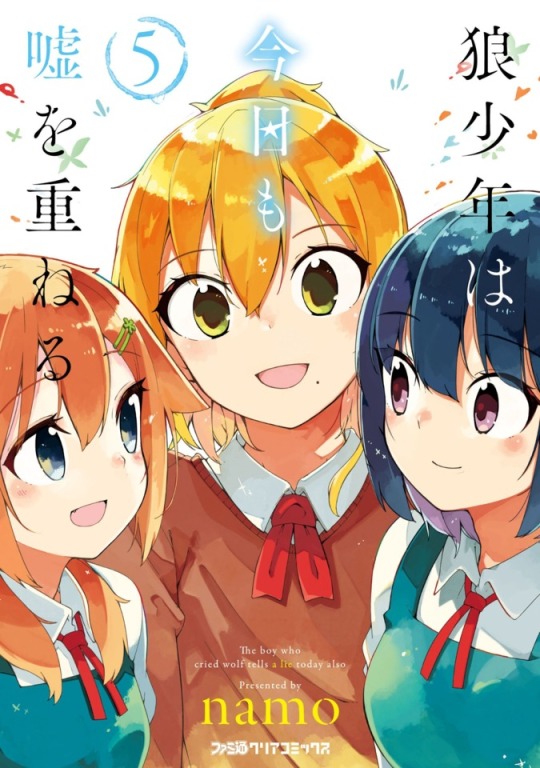
Before you think I’m getting spoilery, with the intro I gave or anything I don’t mark as spoilers, I’m really not. Everything outside of spoilers is right on the package at the start. It sounds like I’m spoiling late-game stuff, right? That’s something that was really fantastic to me: this manga doesn’t spoon feed you. There’s no arcs of pure silent angst, even at the lowest point in the story. These kids are smart, they think and intuit on the spot, and they share what they’re feeling with each other like good friends do. Like that next panel down there with Itsuki introspecting about his confidence level while crossdressing? That’s from the first chapter! These kids are smart. And god damn that is so nice to see.
There was a lot I liked about this manga, but at the top is how compelling the protagonist and his internal conflict are. Right from the first chapter he’s already wracked with guilt about what he’s about to do: deceive this girl by pretending to be a safe space. But Tokujira told Itsuki (♀) she hopes to one day be able to fall in love, and Itsuki wants to ensure she can have that - even if it’s not him that gets to confess to her. He’s fully aware of exactly how fucked up what he’s doing is, and is appropriately beating himself up over it in a really realistic way. But although the guilt never fades, it slowly gains company in happiness. He enjoys this new, fragile life he has constructed around the two precious new friends he's made as a girl.
It was probably easy to gloss over in the synopsis, but arguably the biggest part of Itsuki (♂)’s conflict is his complex about his face. He looks dangerous, and because of that he is afraid to even lift his head or smile in front of others. But as Itsuki (♀), he smiles and laughs without fear. It becomes immediately clear to him on the first day that he's a more confident person while crossdressing. Happier in a way he can't be as a man.

Botan is easily my favorite character in the series. She’s introduced early on, as Tokujira’s first and only friend before Itsuki (♀). At the start she’s a dangerous third wheel, a serious threat to Itsuki’s ability to keep up his lie. And though the situation is (thankfully) defused rather quickly, she becomes a massive source of internal conflict for Itsuki. Nonetheless, she becomes a dear friend for both Itsuki ♂ and ♀. She’s just so...*chef’s kiss*
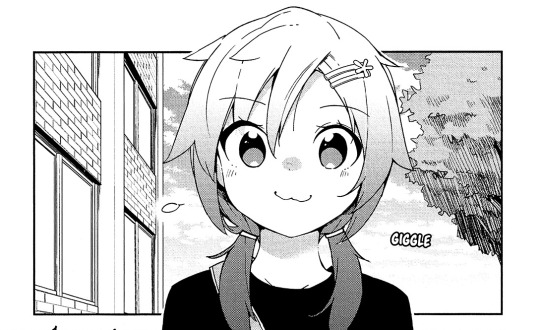
^This face is the repository of all my love and affection.
Mark my words, this is the first and I assume last time I will ever say this: love triangle good. You know it’s inevitable in a romance genre piece, but this manga approaches the trope in a new and compelling way. [Spoiler] Needless to say, it’s between Itsuki, Tokujira, and Botan. But...there’s two Itsukis involved, ♂ and ♀, and in the center of it all is this lie. His lie stops being about him: it's about not hurting these two girls he cares so much about. [/Spoiler]
On a more personal note, I saw so much of myself in Itsuki’s older sister, Ibuki. She runs a salon, catering especially to crossdressers and transwomen. She’s a self-described “Youthling”, an alien from the planet Youth, obsessed with observing the exciting and turbulent lives of the youths of earth. For more or less for the same reasons most of us do: transpeople don’t tend to get the youths we want, if we allow ourselves to experience youth at all. So it’s nice to be able to enjoy it vicariously, through this younger generation that is able to more fearlessly pursue the lives we couldn't.
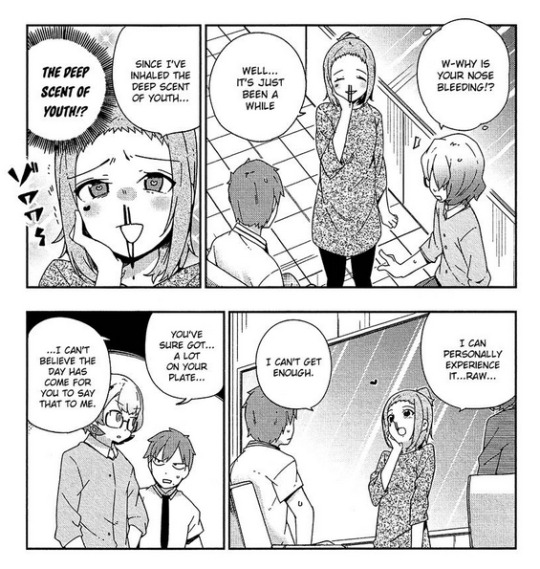
^Incidentally, one of my favorite interactions in the manga.
Despite getting Itsuki into this crossdressing mess, she’s someone he can always return to and confide in, and get good, helpful advice from. Her whole philosophy is to give young people agency to explore their identities and find themselves, and though she tells Itsuki the road he's taking is dangerous as soon as she learns what he's doing, she'll always support him however she can.
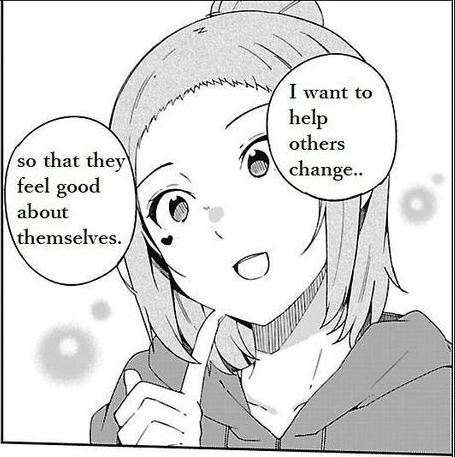
That, I feel, is what separates her from other, more creepy/pedophilic enabler types, like Sawako from K-On! or Lucoa from Dragon Maid. It’s a refreshingly honest and respectful portrayal of a quirky adult just trying to be a good older sister.
The last thing I want to say, and I’m not going to even mark this as a spoiler because of course it’s going to happen and if you can’t predict that then you’re not my problem, is that Itsuki of course eventually has to drop his lie. All I’ll say about it is that it is probably going to live in my head for years. Everything about it, the lead up, the execution, the fallout, and the recovery, are all so masterfully crafted for maximum emotional impact.
That’s all I want to say exclusively about my personal feelings. On to analysis. There will be a lot more contextual spoilers here that, even without reading the parts I’ve specially blocked off will probably leak through. Read at your own risk, but I would recommend revisiting after you have finished the manga.
One thing I really want to talk about is language. That’s right, I’m going to compare a crossdressing manga to The Narrative of the Life of Frederick Douglass, the autobiography of a freed slave turned abolitionist. Douglass talks about a concept that has remained imprinted on my mind ever since I first read it: how and why slaves struggled to comprehend the concept of freedom. This wasn’t anything to do with fear or “racial inferiority” like pro-slavers would argue, but rather with a lack of vocabulary. They have all of these feelings and things they know to be true, but lack the words to make meaningful sense of them. For Douglass specifically, his life completely changed when he learned the word “abolition.” It was like a floodgate burst, as he was suddenly able to put meaning to feeling, create context from chaos.
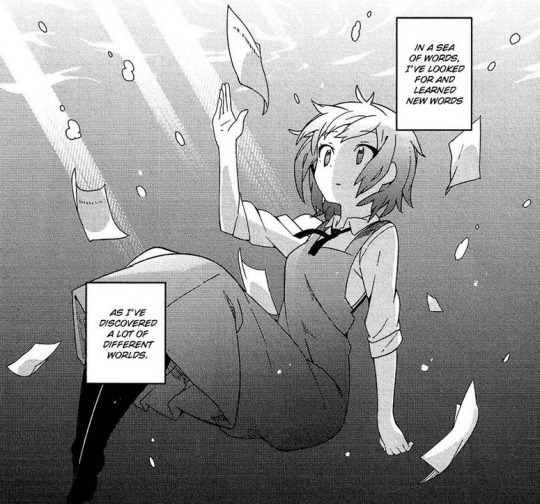

And that’s right, we see that happen in a big way, with Tokujira. This should be an obvious development, but as it happens late in the manga I will mark it [Spoiler]. As Tokujira and Itsuki (♀) practice things like talking, eye contact, holding hands, etc., Tokujira naturally starts to fall for Itsuki (♀). But she doesn’t understand that. An important part of her character is that, growing up, she focused on expanding her vocabulary as much as humanly possible in the hopes of being able to better articulate herself. So words are very important to her. It’s not until she sees a work of lesbian fiction on display that she finally realizes that’s the word she’s looking for. The floodgate bursts, and all of her emotions suddenly make sense. She realizes she loves Itsuki (♀). [/Spoiler]
And I think that is a vital and underexplored concept when discussing LGBT youth, especially in countries where even knowledge of these concepts is taboo. The reason so many LGBT youth struggle with their identities, especially trans youth, is because we do not have the vocabulary to conceptualize our feelings. I am always excited to see this concept play out, especially in this context. It’s such an important thing that needs to be addressed more broadly.
Moving on, I want to talk about historical context of the genre as it relates to what the author did here. Notably, I want to talk about a specific trope rampant in Japanese queer fiction, specifically early lesbian fiction: the idea that queerdom is a meaningless, youthful phase that children will naturally and inevitably grow out of. It’s problematic for obvious reasons.
[HELLA HELLA SPOILERS] My kneejerk reaction to the ending of this manga was that the author fell into this trope. In the end, Itsuki comes to the conclusion that he does not need to crossdress. So again, kneejerk. But...it really wasn’t like that. He never had any dysphoria; crossdressing was always just a necessity of his circumstance. Nonetheless he learned to analyze and value his experience crossdressing as a woman, and because of that grew as a man. And as part of his journey to understand his identity we, through him, see why some people crossdress. Along with his example, we see why his sister, a bona fide post-op transsexual, has made it a permanent change to her life. Likewise, we see Miyama, who crossdresses purely for the gender euphoria, but has no (stated) interest in going all the way. These are all presented as valid and meaningful. [/Spoiler]
Crossdressing, and gender nonconformity in general, is portrayed not as some one-dimensional fetish like cultural taboo would depict it to be, but rather a meaningful exercise for exploring and critically analyzing your own identity. For some, yes, it’s a phase, but an importantly transformative one when done right. While for others, it is a gateway to a new way of experiencing and enjoying life. Or, it’s fun just for the pragmatic reasons...
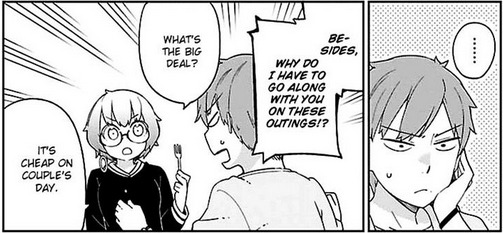
I honestly cannot recommend this manga enough. Tragically, I cannot imagine it ever getting an official english translation, so you’ll have to settle for a scanlation like the one I linked in the title up top (and here, again). It’s a really good translation, though the site is predictably sketchy. Warning for lots of NSFW ads.
Read it, and then come talk to me about it!!! There is basically zero fan community and I need to fangirl with someone!
#long post#and I mean REALLY long post#Ookami Shounen Wa Kyou Mo Uso O Kasaneru#The Boy Who Cried Wolf Also Told a Lie Today#the boy who cried wolf tells a lie today also#analysis
9 notes
·
View notes